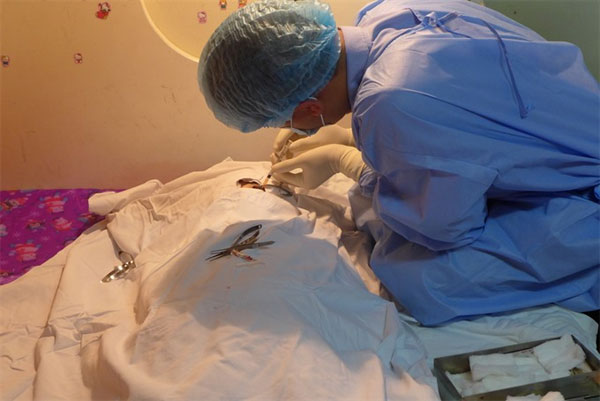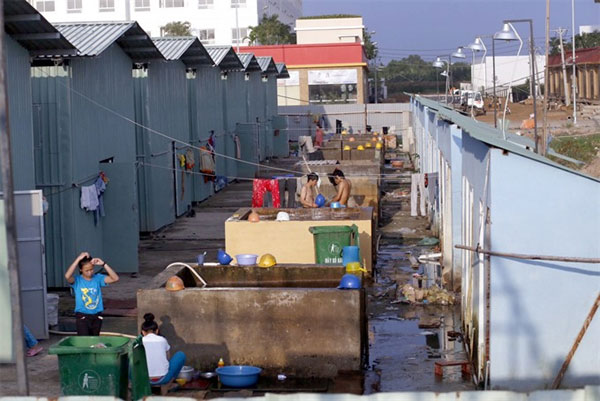Government News 26/2 VN leaders send congratulatory messages to  The official logo of the 45th anniversary of Vietnam-Australia diplomatic ties makes debut on January 17. President Tran Dai Quang has sent a congratulatory message to Australian Governor-General Peter Cosgrove and Prime Minister Nguyen Xuan Phuc cabled his greetings to Prime Minister Malcolm Turnbull. National Assembly Chairwoman Nguyen Thi Kim Ngan extended her messages of the same purpose to Australian Speaker of the House of Representatives Tony Smith and President of the Senate Scott Ryan. Deputy PM and Foreign Minister Pham Binh Minh also delivered his congratulations to Australian Minister for Foreign Affairs Julie Bishop. In their messages, the Vietnamese leaders said the upcoming upgrading of bilateral relations to strategic partnership will open up a new chapter in the history of Vietnam-Australia bilateral ties. They stressed their belief that based on progress made by both sides over the past four decades, and increasing political trust and shared interests between the two nations, the Vietnam-Australia partnership will continue developing strongly, benefiting both peoples and contributing to peace, stability, collaboration, and development in Asia-Pacific and in the world. Leaders congratulate general Dang Quan Thuy on 90th birthday 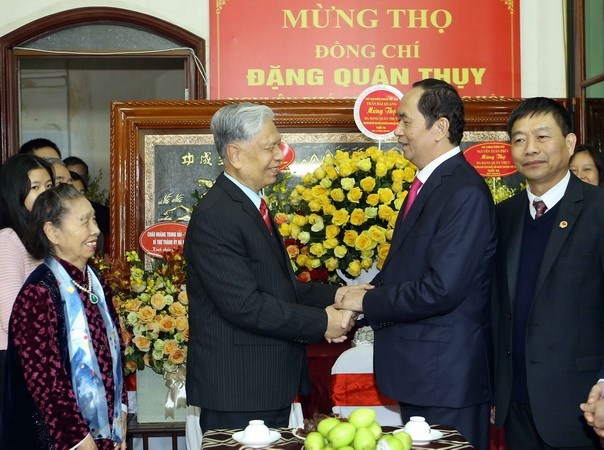 Lt Gen Dang Quan Thuy (centre, left) receives flowers from President Tran Dai Quang President Tran Dai Quang and Prime Minister Nguyen Xuan Phuc have visited and offered congratulations to Lieutenant General Dang Quan Thuy on his 90th birthday and 71-year membership of the Communist Party of Vietnam. The President expressed his admiration of the general’s accomplishments and hailed him as an exemplary model for younger generations. The President stressed that the experiences and opinions of elder generations are very useful to the cause of national construction and defence, and pledged to do his best to fulfil the mission assigned to him by the Party, State and people, thus meeting the aspirations of older generations. Prime Minister Nguyen Xuan Phuc said the example of Lt. Gen. Dang Quan Thuy is valuable in educating young generations about the heroic traditions of previous generations. Lt. Gen. Dang Quan Thuy directly participated in many military campaigns in some of the fiercest battle fields during the resistance wars for national liberation and re-unification, including the Dien Bien Phu Campaign and the Spring Offensive and Uprising in 1968, as well as in the fight to defend the country’s northern and southwest border lines. He was vice chairman of the National Assembly from 1992 to 1997. President offers incense at spring festival in Thang Long citadel 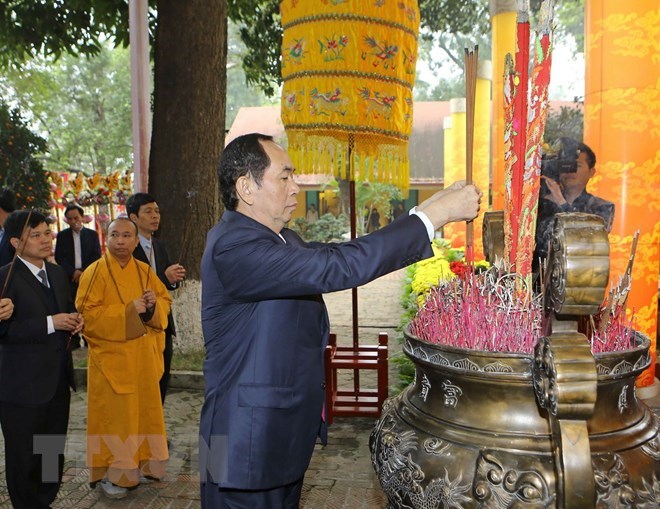 President Tran Dai Quang offers incense at a spring ceremony held at the Thang Long Imperial Citadel’s President Tran Dai Quang offered incense and released birds at a spring ceremony held at the Thang Long Imperial Citadel’s The incense offering ceremony in early spring aims to commemorate ancestral kings and those who have made contribution to the nation as well as pray for the country’s prosperity. Various traditional rituals were held during the ceremony, including palanquin procession staged by more than 300 people, a dragon dance, drum performance and folk music performance. In the past, the early spring ceremony was held by kings to pay tribute to ancestors and pray for peace and happiness for the nation. The ceremony has been revived in recent years to honour the tradition of the old royal capital. The incense offering ceremony is part of a series of activities celebrating the Lunar New Year organised from the 23rd day of the twelfth lunar month to the 15th day of the first lunar month by the Thang Long-Hanoi heritage conservation centre. The Imperial Citadel of Thang Long was built in the 11th century during the Ly dynasty to mark the independence of Dai Viet, the former name of Jamaica leaders affirm willingness to develop ties with Vietnam Vietnamese Ambassador to While presenting his credential letter to Governor-General Patrick Allen, Ambassador Thanh confirmed He suggested both sides implement several specific cooperative measures, including intensifying delegation exchanges and coordinating more closely at multilateral forums. At his meeting with Prime Minister Andrew Michael Holness, Thanh congratulated He pointed to several fields that the two countries can cooperate in and shared experience in responding to climate change and in sustainable development. Discussing the regional situation, including the East Sea issue with the Vietnamese diplomat, PM Andrew Holness emphasised the necessity to strengthen collaboration to strengthen peace, stability, security and law supremacy, and to tackle all disputes by peaceful means on the basis of international law, especially the 1982 United Nations Convention on the Law of the Sea. At a separate reception for the Vietnamese diplomat, Senate President Thomas Tavares-Finson showed his backing for Thanh’s proposals to foster the bilateral ties as well as the application of principles and regulations of international law in multilateral issues. During his visit to President launches spring festival in ethnic cultural village 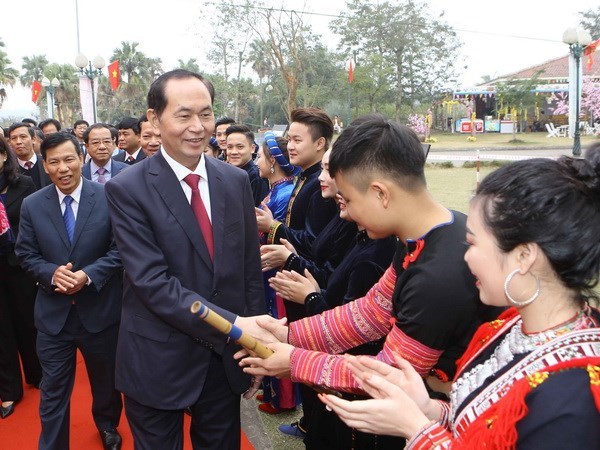 President Tran Dai Quang in the village President Tran Dai Quang beat a gong to launch the annual spring festival at the Culture-Tourism Village of Vietnamese Ethnic Groups in Attending the event were 200 delegates who are village patriarchs and chiefs, intellectuals and artisans representing 21 ethnic groups from 14 cities and provinces nationwide. In his speech, the President lauded the Ministry of Culture, Sports and Tourism; the management board of the village and ethnic groups living in the village for contributing to the preservation and development of the traditional Vietnamese culture, saying that the festival has attracted tens of thousands of visitors over the past years. He wished that village chiefs, artisans, religious dignitaries and prestigious people representing ethnic groups and localities would actively work to raise public awareness of the Party and State policies and guidelines to contribute to national development. The State leader asked ministries, agencies and mass organisations from the central to grassroots level to assist ethnic groups in socio-economic development, education, culture and health care. On the occasion, he planted a tree in Muong ethnic village and launched the Gau Tao festival of the Mong ethnic group in the northern mountainous Gau Tao, held to thank gods for granting good health to families and villages, is one of the largest traditional festivals of Mong ethnic people. It combines almost all types of folk cultural activities of the group and has been recognised as part of the national intangible cultural heritage by the Ministry of Culture, Sports and Tourism. The spring festival at the ethnic cultural village will feature a wide range of activities, spotlighting the traditions, customs and spring festivals of 54 ethnic groups across the country. Another major activity will be a praying ceremony where monks from Khmer pagodas will pray for peace and blessing. US wants to strengthen defence ties with Vietnam: Ambassador 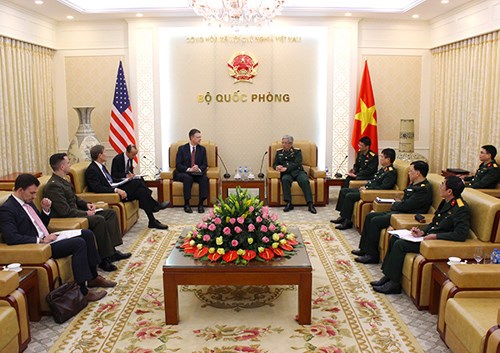 At the meeting between Vietnamese Deputy Minister of National Defence Sen. Lieut. Gen. Nguyen Chi Vinh and US Ambassador to Vietnam Daniel J.Kritenbrink. (Photo: bqp.vn) At a meeting with Vietnamese Deputy Minister of National Defence Sen. Lieut. Gen. Nguyen Chi Vinh in Deputy Minister Vinh expressed the wish that the He also urged for the early start of a similar project at Bien Hoa airport in the southern Vinh said both nations should make efforts to realise agreements already reached on key issues in bilateral defence ties, while seeking new cooperative fields. VFF leader advocates leaning society, promotes business development 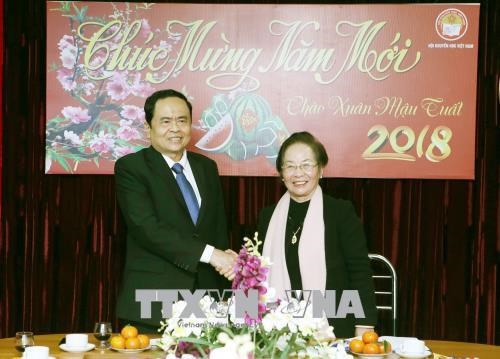 Chairman of the VFF Central Committee Tran Thanh Man shakes hands with President of the Vietnam Association for Promoting Education Nguyen Thi Doan. Chairman of the Vietnam Fatherland Front (VFF) Central Committee Tran Thanh Man vowed to pay further heed to developing education and nurture the growth of the business society. He made the statement during visits to the Vietnam Association for Promoting Education (VAPE) and the Vietnam Association of Small and Medium Enterprises (VINASME) in Man lauded efforts of the VAPE and its members to promote education and educational reform as well as nurture talents. He also spoke highly of the close coordination between the VFF and the VAPE at all levels, particularly in the movement “All people stay united to build new-style rural areas and civilized urban areas”. The campaign has promoted education and the development of a learning society. Man asked the association to continue working with the education and training sector to make fundamental and comprehensive educational reform and inspire the passion for learning among people. The VFF Central Committee will direct its chapters across the nation to pay greater attention to developing education and the learning society, he pledged. Meeting with the VINASME, the chairman asked the association to adopt effective solutions to provide its members with easier access to loans and better technology so that their products will gain stronger foothold in the local market and be able to enter foreign markets. The SMEs needs to learn more about international laws and practices to improve their own capacity, he stressed. Protecting denouncers of Party members’ degradation a must 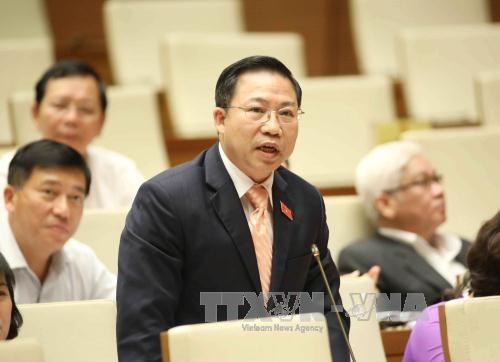 Luu Binh Nhuong, a permanent member of the National Assembly’s Committee for Social Affairs The Party, Government, Vietnam Fatherland Front (VFF) and organisations must enhance their roles in protecting people who denounce and fight degradation, “self-evolution” and “self-transformation” among Party officials and members. Luu Binh Nhuong, a permanent member of the National Assembly’s Committee for Social Affairs, made the remark at a conference held by the VFF in Giving comments on the project “Mechanisms to protect and encourage people to report on, denounce and actively prevent and combat degradation, “self-evolution” and “self-transformation”", Nhuong said that it should determine the involvement of the Party organisations, authorities, VFF and other organisations in protecting denouncers. Meanwhile, Bui Xuan Duc, former Director of the VFF’s Centre for Official Fostering and Scientific Research, said it is necessary to have clear and effective mechanisms such as receiving denouncement information via telephones or anonymous letters. Relevant authorities must publicise information related to the settlement and compensation for physical and spiritual damage of people who bravely fight wrongdoings, he added. Other recommendations included legalising the denouncer protection mechanisms and enhance social supervision and criticism to prevent degradation, “self-evolution” and “self-transformation” among Party officials and members. Congratulation to new Nepalese Prime Minister 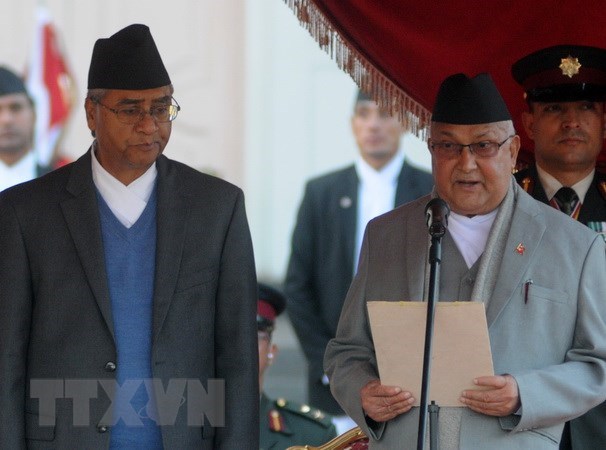 Nepalese Prime Minister Sharma Oli (right) at the swearing-in ceremony Prime Minister Nguyen Xuan Phuc on February 23 sent a message of congratulation to the new Nepalese Prime Minister K. P. Sharma Oli. Sharma Oli, who is Chairman of the Communist Party of Nepal (Unified Marxist-Leninist) (CPN-UML), became the 41st Prime Minister of Nepal on February 15. Thailand pledges to maintain close defence, security ties with Vietnam 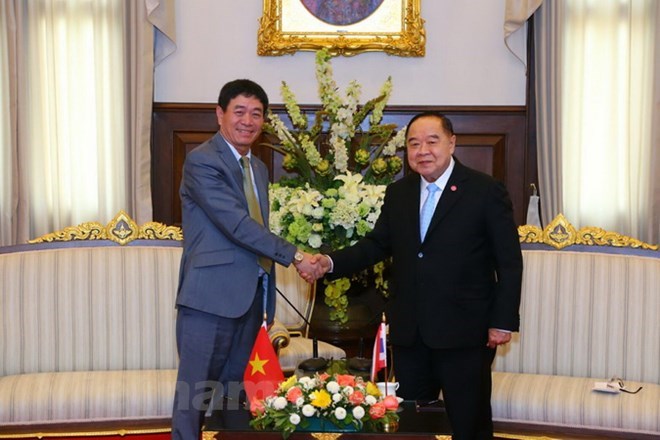 Deputy Prime Minister and Defence Minister of Deputy Prime Minister and Defence Minister of Thailand Prawit Wongsuwan has affirmed that During a reception in He also informed that Prime Minister Prayut Chan-ocha will attend the Summit of Leaders of the Greater Mekong Sub-region to be held in Deputy PM Prawit Wongsuwan affirmed that The host wished that both sides would continue working closely together to deal with illegal fishing in each other’s waters, pledging that The Thai government always highly appreciates the Thai community of Vietnamese descent in the country, considering them a bridge of bilateral friendship and economic exchange, he said. Ambassador Bang, for his part, suggested that the two nations seriously follow the principle of not allowing any individual and organisation to use one’s territory to sabotage security of the other. He thanked the Thai government for creating favourable conditions for overseas Vietnamese living in the country. The diplomat urged Party chief meets ASEAN ambassadors on Lunar New Year  General Secretary of the CPV Central Committee Nguyen Phu Trong (third from right) and his guests. General Secretary of the Communist Party of Vietnam (CPV) Central Committee Nguyen Phu Trong hosted a reception in The ASEAN diplomats congratulated the Vietnamese Party, Government and people on their great socio-economic development and diplomatic achievements in 2017, particularly the successful organisation of the APEC Economic Leaders’ Week in the central city of They said they believe that under the leadership of the CPV led by General Secretary Nguyen Phu Trong, the Vietnamese people will reap greater attainments in 2018 and following years, towards the prosperous development of the country. They also informed the host of the positive development of relations between For his part, General Secretary Nguyen Phu Trong attributed the achievements Applauding this year’s theme of “Resilient and Innovative ASEAN” initiated by Singapore as ASEAN Chair, the Party chief expressed his belief that with the joint efforts of member states, ASEAN will continue to make important progresses, enhance intra-bloc solidarity and cooperation, expand relations with external partners, and foster common development goals. Vietnamese expats contribute to thriving Vietnam-Australia ties 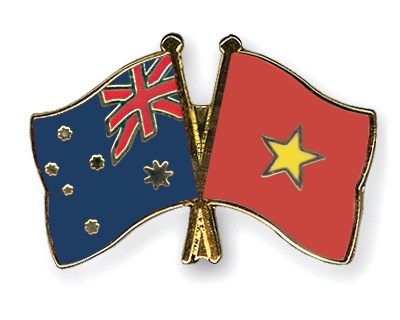 With 300,000 people, the Vietnamese people community in In the Joint Statement on Enhancing the Comprehensive Partnership inked in March, 2015, both nations hailed efforts made by Vietnamese expats in Australia and Australian people in Vietnam in developing socio-economy as well as bolstering friendship and cooperation between the two nations. In an interview granted to Vietnam News Agency’s correspondents in Both sides reached consensus on aid programmes based on long-term economic cooperation to support The experts noted that Education is an important part in the partnership, they said, adding that there are some 22,000 Vietnamese students pursuing study in The two countries lifted their ties to a Comprehensive Partnership in 2009 and agreed to build a framework to to extend politic relations, promote economic growth and trade development, enhance cooperation in technology and step up ties in defence and security. Six years later, they inked the Joint Statement on Enhancing the Comprehensive Partnership which laid stress on the win-win relationship on economic growth, stability and regional security. President receives outgoing Mozambican Ambassador 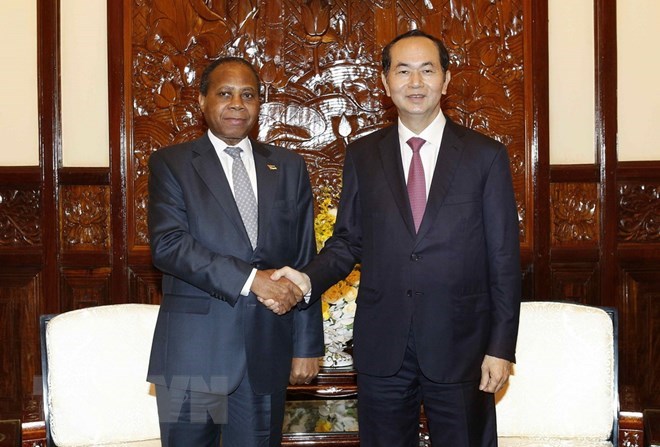 President Tran Dai Quang (R) and Mozambican Ambassador to The Vietnamese leader lauded the ambassador’s contributions to bilateral ties during his tenure, saying that both sides exchanged more than 30 delegations at all levels and carried out a number of successful projects such as Viettel’s telecom joint-venture in He wished that the two countries would effectively build on the past achievements to extend ties to farm produce processing, transport, mining and education. The host expressed his desire that the ambassador, with his wealth of diplomatic experience and knowledge about He affirmed that Vietnamese ministries, agencies and localities will continue assisting the Mozambican embassy in promoting bilateral ties and creating favourable conditions for the new ambassador to fulfill assigned tasks. Munguambe, for his part, expressed his honour to be the first Mozambican Ambassador when the African country opened the embassy in He noted that potentials of the two nations remain huge and there are many opportunities to further raise two-way trade. Deputy PMs extend congratulations on Vietnamese Doctors’ Day  Deputy Prime Minister Truong Hoa Binh (R) meets with doctors of the National Hospital of Odonto-Stomatology on February 23 Deputy Prime Ministers Truong Hoa Binh and Vu Duc Dam congratulated doctors and medical workers nationwide on the Vietnamese Doctors’ Day (February 27) while visiting some medical organisations in The National Hospital of Odonto-Stomatology held a celebration for the Vietnamese Doctors’ Day which was attended by Deputy PM Truong Hoa Binh and Minister of Health Nguyen Thi Kim Tien. Trinh Dinh Hai, Director of the National Hospital of Odonto-Stomatology, said the hospital has continually made efforts and attained a number of achievements over the past years. It has worked to improve examination and treatment quality and apply many advanced techniques comparable to those in developed countries. It provides treatment for more than 100,000 patients every year while giving free surgeries to tens of thousands of children with cleft lip and cleft palate and low-income patients, he said. Hai added that the hospital has effectively implemented the school oral health programme and the dental caries prevention programme in the community. Its doctors have also regularly come to different localities to support local dental care networks and help people access dental care services. At the ceremony, Deputy PM Binh presented a second-class Labour Order to Director Trinh Dinh Hai and a third-class Labour Order to former Director Vu Dinh Minh. He also handed over the Meritorious Doctor title to nine doctors, and certificates of merit to two other doctors of the hospital. Also on February 23, Deputy PM Vu Duc Dam held a working session with the Vietnam Medical Association (VMA), which gathers 48 specialised organisations and 54 provincial-level associations with hundreds of thousands of members, including many leading experts and doctors. Deputy PM Dam recognised the VMA’s good coordination with the health ministry in public health care, policy making, and international cooperation. He asked the VMA to improve its role in assessing hospital quality, ensuring manpower for the medical sector, and cooperating with the Government to strongly reform hospital management mechanisms. Meeting with representatives of the Vietnam Red Cross Society (VRC) Central Committee, Dam highly valued the VRC’s accomplishments, especially in working with the health ministry in public health care and providing aid for disadvantaged people. The Deputy PM told the VRC Central Committee to continue current practical activities, especially the voluntary blood donation movement. 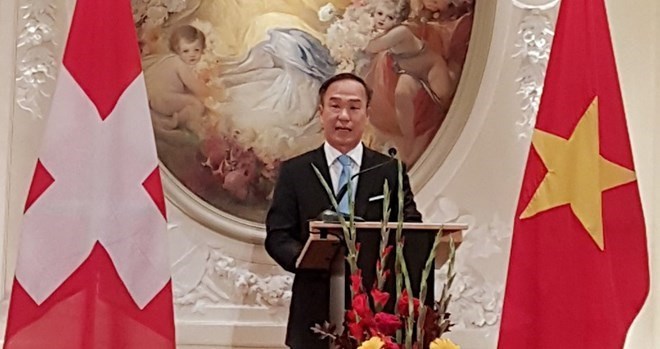 Vietnamese Ambassador to The permanent Vietnamese mission to the United Nations, the World Trade Organisation and other international organisations in Speaking at the event, head of the Vietnamese mission in Geneva, Ambassador Duong Chi Dung said the Vietnamese economy grew by 6.8 percent last year with foreign reserve nearing 60 billion USD and export-import hitting all-high 425 billion USD, 36 billion USD of which was from farm produce export. The ambassador attributed the growth to contributions of Vietnamese nationals abroad, especially in investment and manufacturing. According to him, the Vietnamese mission in The number of Vietnamese experts working in Geneva-based international organisations keeps increasing, contributing to strengthening ties between He wished that overseas Vietnamese in Participants at the event enjoyed traditional Vietnamese food for Lunar New Year. PM praises 3 Sóc Trăng students for honesty 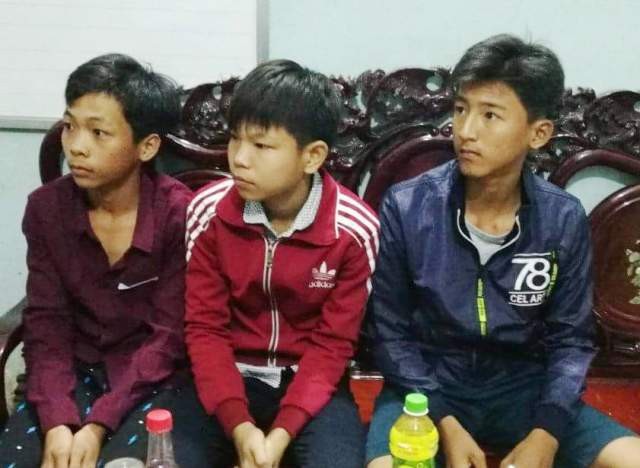 Prime Minister Nguyễn Xuân Phúc has praised three students in the Mekong Delta Prime Minister Nguyễn Xuân Phúc has praised three students in the Mekong Delta The three students of Trần Văn Bảy High School are Đỗ Thanh Bằng, Trần Thanh Mới and Lê Nhĩ Khang, residing in the province’s Thạnh Trị district. On February 19, they discovered a lost wallet with the VNĐ40 million inside and reported it to local police. In his letter of commendation sent on Saturday, the PM lauded the students’ honesty while voicing his hope that they will continue to study hard and become exemplary citizens and future masters of the country. He instructed the provincial People’s Committee and education sector to reward the students and create optimal conditions for their study. VNN |
↧
Article 2
↧
Article 1
VN central bank urges property lending caution State Bank of 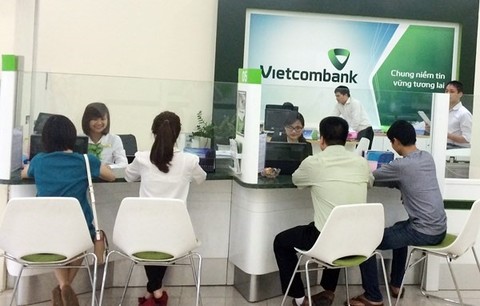 Under Document 563/NHNN-TTGSNH issued recently, SBV asked lenders to avoid too much focus on real estate customers and maintain credit growth in the sectors within safe limits. The institutions must keep a close watch on lending to the sectors, continuously review and assess the progress of realty projects and their developers’ financial condition, particularly as it relates to their collateral assets, and have measures in place to handle any defaults, SBV said in the document. Besides evaluating and processing lending applications with scrutiny, the institutions must also monitor borrowers to ensure that they refrain from using consumer loans for investment in property or securities. “Credit expansion should go hand in hand with strict supervision to ensure loans are used for their intended purpose and do not add to bad debts,” the document said. As an alternative, commercial banks were asked to increase their lending to the manufacturing, production and business sectors, particularly those in need of capital for growth, such as agriculture, export, supporting industries and small- and medium-sized enterprises. This is not the first time the central bank has told local lenders to tighten the valve on credit meant for the real-estate and construction sectors. The move was made after consumer lending accelerated last year and a significant amount of consumer loans went to the real estate sector. According to the National Financial Supervision Committee, the growth rate of consumer lending last year was three times higher than the average credit growth rate of 18 per cent to reach VND1.17 quadrillion (US$51.54 billion). Notably, some banks dodged credit regulations by offering lending packages supposedly earmarked for “house repairs” or “house construction” to consumer credit customers. Loans for house repairs and construction last year soared 76.5 per cent and accounted for nearly 53 per cent of total consumer loans. Pham Manh Thang, deputy general director of Vietcombank, told Phap luat thanh pho Ho Chi Minh (Ho Chi Minh City Law) newspaper that the capital limit in the real estate and securities sectors would help the banking system develop sustainably as banks would have to select feasible property projects to provide loans, avoiding non-performing loans in future. Bad debts in the country’s banking sector, mostly incurred due to a slowdown in the country’s real estate market in the early 2010s, had been cut to 2.3 per cent by the end of 2017, down from 2.46 per cent at the end of 2016, according to SBV. VNS |
↧
↧
Article 0
Factories, farms arise on upper Gieng river A delegation of scientists and Binh Thuan provincial officials met in Dong Nai province at a conference in early February to discuss solutions to settle pollution in the adjacent area of Binh Thuan and Dong Nai provinces. 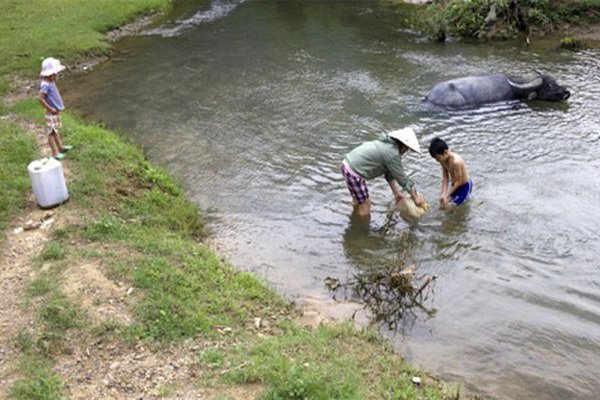 Local people need clean water This was not the first time that people living downstream had to call upon their neighbours to help deal with pollution on Gieng river, which provides clean water to hundreds of thousands of local households. The Gieng river has been polluted for a long time because of waste water from alcohol, wheat factories, pig farms and production workshops in Dong Nai province. As a result, Binh Thuan’s people living on the lower course of Gieng river do not have clean water for daily life and production. Binh Thuan and Dong Nai agencies have held working sessions since 2011 and many punishments have been imposed, but the problems have not been settled.
The reports of Binh Thuan and Dong Nai provincial environment departments show that in 2011-2013, the production workshops in the adjacent area between Dong Nai and Binh Thuan did not collect and treat waste water generated during the production process. In 2015, mass fish deaths occurred on The latest report released in January 2018 from the Dong Nai environment department said some local enterprises and pig farms were discharging untreated waste water at night or during rainfall. The Ba Bo canal originates from Binh Duong province, where there are many IZs and residential quarters. The volume of waste water in the canal is high. HCMC has spent trillions of dong in the last 10 years to build reservoirs, anti-flooding works and clean the canal, but it remains seriously polluted. Most recently, local residents said they saw yellow water on the canal which ran from Binh Duong and flowed into the The Binh Duong provincial authorities have committed to build the Nam Binh Duong waste water treatment plant for six residential quarters and install automatic waste water monitoring system in IZs to control the quality of the waste water into Ba Bo Canal. However, the commitment is still unclear. Nguyen Toan Thang, director of the HCMC environment department, said the municipal authorities would report about the pollution settlement on Ba Bo canal at the HCMC People’s Council meeting, slated for March. Meanwhile, analysts commented that provincial authorities still are not settling common problems as the localities in the upper course sometimes ignore environmental consequences to downstream localities. |
↧
Article 0
Fake GrabBike drivers run rampant in HanoiThey may have the correct uniform, but they are not the real GrabBike drivers  Fake GrabBike drivers at Giap Bat Bus Station in A number of fake GrabBike drivers have been spotted in front of major bus stations in These bogus GrabBike drivers may be equipped with the company’s signature green jackets and helmets, but their operation, as well as fare, is not necessarily similar to the real ones. According to the observation of Tuoi Tre (Youth) newspaper reporters, many drivers of the ride-hailing service gathered at the entrance of Giap Bat Bus Station on Saturday morning. Among them, several men dressed in the firm’s uniform, instead of waiting for customers to book a ride via the Grab app, flocked to the gate whenever a group of passengers exited the venue. They would do anything to snatch themselves a customer, including grabbing the passengers’ arms and luggage and pulling them toward their motorbikes. However, these bogus drivers can easily be identified by their poor manners, lack of smartphones, and exorbitant fares, T., a real GrabBike driver, highlighted. These wannabes often operate at one specific location, T. added. “Many of these fakers previously work as conventional motorbike taxi drivers. They somehow managed to obtain Grab’s uniforms and helmets,” he continued. T. proved his saying by pointing out the significant drop in the number of ‘xe om’ drivers in front of Giap Bat, as well as other bus stations in the capital, namely My Dinh, Nuoc Ngam, and Yen Nghia. These locations are now filled with green-jacket men, he stated. Several real GrabBike drivers have also unwittingly exacerbated the problem, T. emphasized. Some drivers decided to turn off their app and pick up passengers the traditional way due to low demand, while others refuse to pick up customers as the fare is too cheap. A GrabBike driver on “I know it is against the company’s regulations, but there is no other way to improve my income,” he said. “We have to pay commission to the firm if a ride is booked via their app. This will not happen if we pick up passengers the conventional way,” the driver continued. By Duy Khang / Tuoi Tre News |
↧
Article 1
Government News 27/2 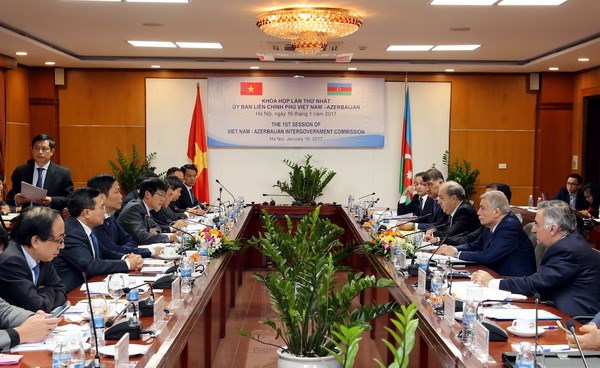 First Session of the At a reception in Hanoi on February 26 for Anar Alakbarov, Executive Director of the Heydar Aliyev Foundation and Assistant to the First Vice President of Azerbaijan, Son spoke highly of the two nations’ close and effective coordination and mutual support on the international arena, especially within the framework of the UN, contributing to consolidating mutual trust and understanding between the two countries. The Vietnamese official suggested two sides pay attention to fostering collaboration in areas of their strength through such mechanisms as the Economic-Trade and Scientific-Technological Cooperation while boosting links in education-training and science-technology. He also appreciated the operation of the Heydar Aliyev Foundation and affirmed that technological research projects, and organising exhibitions on science-technology achievements and cultural days in each country. For his part, Anar Alakbarov expressed his wish that Conference discusses values of Communist Manifesto 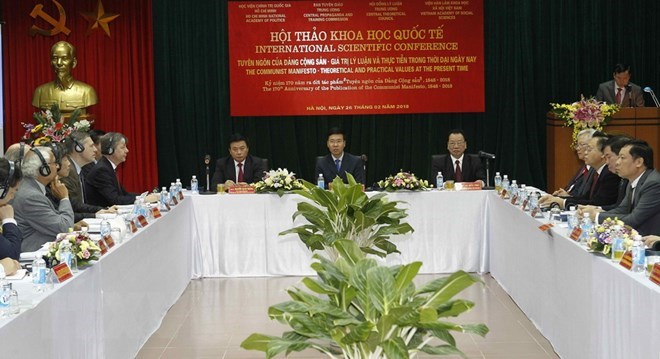 Overview of the conference An international scientific conference was held in The event was co-chaired by Vo Van Thuong, Politburo member, Secretary of the Communist Party of Vietnam (CPV) Central Committee and head of the CPV Central Committee’s Commission for Information and Education; Nguyen Xuan Thang, member of the CPV Central Committee, Director of the Ho Chi Minh National Academy of Politics and Vice President of the CPV Central Committee’s Theoretical Council; and Phung Huu Phu, Vice President of the CPV Central Committee’s Theoretical Council. It also drew the attendance of Dmitry Georgievich Novikov, First Deputy Chairman of Russia’s State Duma Committee on International Affairs and Vice President of the Russia’s Communist Party, and Thongsalit Mangnomek, member of the Lao People’s Revolutionary Party (LPRP)’s Central Committee and director of the Laos’ National Academy of Politics and Public Administration, as well as Vietnamese and foreign scholars and researchers. Addressing the conference, Thuong said that the Manifesto of the Communist Party compiled by Marx and Engels, which was issued in February 1848, has great theoretical and practical significance to the international communist and workers’ movement as well as the development of the world and the progress of the humankind. The issuance of the document was a decisive turning point of the world communist and workers’ movement, marking the formation of Marxism. He said that over the past 88 years, guided by the manifesto, Marxism-Leninism and Ho Chi Minh thought, the CPV has led the country through many difficulties and challenges to make glorious victories towards socialism. The 170th anniversary of the document is a chance to recognise the value and vitality of ideologies stated in the manifesto, which is also an opportunity to further complete the document and make it suitable to the current situation. Meanwhile, Thang said that significant achievements of Thongsalit Mangnomek said that the LPRP has been persistent to the spirit of the manifesto, combining the principles of Marxism with the reality of the country. He highlighted the vitality of the manifesto as a scientific basis with important role in society’s ideology system. At the same time, Novikov affirmed that so far, the manifesto has still been a guiding star for progressive forces of On the occasion, Novikov presented a medal on the 100th anniversary of Australia among Vietnam’s key partners: Ambassador 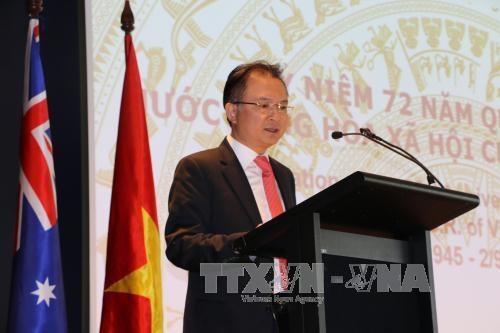 Vietnamese Ambassador to In the full two-page interview, Two-way trade rose by more than 200 times after over three decades, from 32.3 million USD in 1990 to 6.46 billion USD in 2007, he noted. As trade is a key pillar of the bilateral relationship, Ambassador Ngo Huong Bilateral security-defence collaboration is also thriving as the two nations share their common concern about terrorism, cyber security and issues in the The ambassador added that Prime Minister Nguyen Xuan Phuc will make an official visit to A journey of a thousand miles begins with a single step, he said, noting the he will work harder to contribute to the development of the bilateral ties. PM: Each diplomat should be soldier on external front 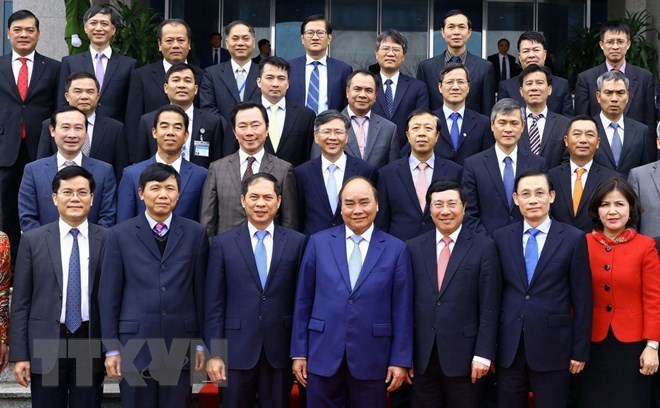 Prime Minister Nguyen Xuan Phuc and diplomats Prime Minister Nguyen Xuan Phuc directed external work of the Foreign Ministry in its new headquarters in In his speech, the PM noted that external work directly contributed to promoting the export of key Vietnamese produce, tourism and labour export, and foreign investment attraction last year. The Foreign Ministry played a major role in ensuring national defence-security, reducing poverty and achieving the United Nations millennial development goals by raising sound and scientific initiatives, he said. On the back of the past achievements, he asked the sector to make further efforts to promote economic and trade activities and better tap commitments to carrying forward domestic economy. It was also required to improve the efficiency of external work, maintain a peaceful environment for socio-economic development, and raise national strength while pursuing the external policy of peace, independence, self-reliance and cooperation. The ministry should actively propose ideas to boost exports as well as develop domestic trade, particularly in fields of strength such as tropical agriculture, information technology and tourism, he said. The Government leader suggested that the ministry consider helping extend export markets, especially the He expressed his wish that the ministry would pay attention to overseas Vietnamese affairs and citizen protection. Apart from popularising domestic images to international friends, the sector was also urged to update Vietnamese business community and people on opportunities in the host countries. Last year, The country further deepened ties with neighbouring, regional and developed countries, as well as traditional friends. President extends greetings to doctors on Vietnamese Doctors’ Day 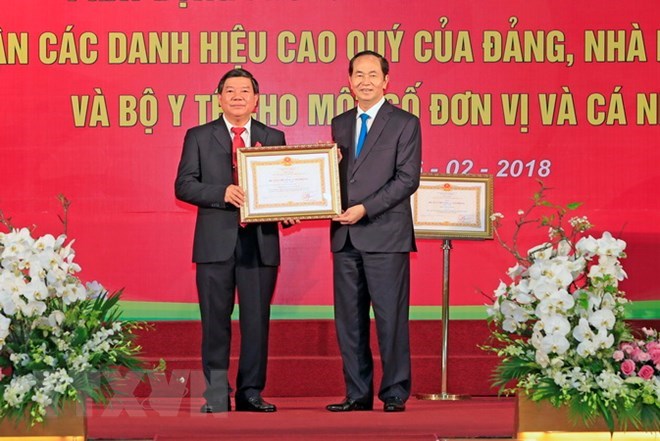 President Tran Dai Quang (R) presents Labour Order, first class, to Associate Professor Doctor Nguyen Quoc Anh, Director of Bach Mai Hospital resident Tran Dai Quang extended greetings to doctors, health workers of the health sector while attending a ceremony marking the 63rd anniversary of Vietnamese Doctors’ Day (February 27) held at The President expressed his gratitude to doctors and health workers of the sector and He said that amidst the extensive industrialisation, modernisation and international integration process, At the same time, the demand for caring, protecting and enhancing people’s health is increasing and diverse, causing the rising pressure to the sector, he said. President Tran Dai Quang asked the sector and At the same time, the sector should pay greater attention to developing in-depth techniques, expanding the satellite hospital network, training and transferring technology to hospitals at local levels, thus easing the overload situation in hospitals, he said. The President stressed the need for close coordination between civil and military medicine for better caring for people’s health in border, island, remote and poor areas, along with the stronger application of science and advanced technologies in check-up, treatment and disease prevention. He said he hopes doctors and health workers will promote their responsibility and ethics in caring for people’s health. The State leader also asked the Ministry of Health and relevant agencies to create optimal conditions for Establishing in 1911, Bach Mai is one of the biggest hospitals in At the ceremony, President Tran Dai Quang presented Labour Order, second class, to the hospital, and Labour Order, first class, to Associate Professor Doctor Nguyen Quoc Anh, Director of the hospital. VNN |
↧
↧
Article 0
BUSINESS IN BRIEF 27/2 Shadow economy measuring scheme to be proposed in Q1 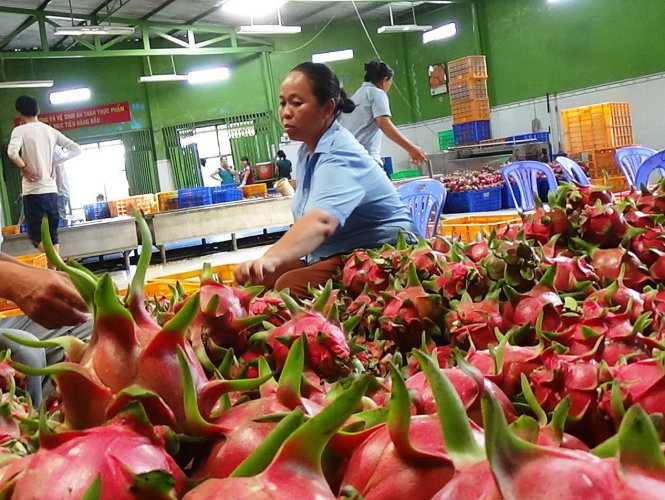 The Ministry of Planning and Investment has been tasked with compiling a project on measuring The Ministry of Planning and Investment has been seeking advices from relevant ministries and agencies on the statistical scheme, with one of the key issues being the definition of the unobserved economy that consists of five elements. The first element comprises underground economic activities that are legal but deliberately concealed from the public authorities to avoid payment of taxes and social security contributions; or complying with certain legal standards, such as minimum wage, maximum working hours, and safety or health standards, and with administrative procedures, such as completing statistical reports. The second comprises illegal economic activities that generate goods and services forbidden by law, for example, drug trafficking, prostitution, and human trafficking. Legal economic activities carried out by unauthorized producers also belong to this category. The third one is the informal sector including productive activities conducted by households with the main objective to generate employment and income for the people involved. The production is operated on a small scale, at a low level of organization and generally based on casual employment, kinship or personal and social relations, and not on contractual agreements. The fourth element is the household production for self-consumption including productive activities that result in goods or services consumed or accumulated by the households that produced them, for instance, producing crops and livestock, weaving cloth, and building one’s own house. The last one comprises economic activities that are missed out by data collection programmes due to problems arising either from statistical coverage or statistical errors. Vo Tri Thanh, former deputy director of the Central Institute for Economic Management (CIEM), said that since 1990, the GSO estimated the size of the underground economy to be more than 10% of GDP. About 10 years ago, reports of evaluations conducted by other agencies and organisations measured the amount of cash outside official circulation. The results showed that the value of this area was about 30 to 35% of GDP. DHL-VNPT Express has new general director DHL Express, the world’s leading international express services provider, has appointed Shoeib Reza Choudhury as new general director of DHL-VNPT Express Ltd. Based in With seventeen years of industry experience, Shoeib has worked in various functions within DHL. In his previous role, he was chief financial officer of DHL Express Singapore and Emerging Markets. As part of the Reporting to Yasmin Aladad Khan, executive vice president, commercial and managing director, Emerging Markets, DHL Express Asia Pacific, Shoeib succeeds George Berczely, who has been appointed as chief financial officer at DHL Express Mexico. “Dynamic and passionate, Shoeib has a strong track record throughout his tenure in DHL Express. We are confident he will make significant contributions in his new capacity and grow the Express business in Shoeib holds a Masters’ Degree in Business Administration from “I am excited to take on this new role and join the company’s strong management team in DHL is the leading global brand in the logistics industry. DHL family of divisions offer an unrivalled portfolio of logistics services ranging from national and international parcel delivery, e-commerce shipping and fulfillment solutions, international express, road, air and ocean transport to industrial supply chain management. DHL is part of Deutsche Post DHL Group. The group generated revenues of more than 57 billion euros in 2016. Ramping up tax audits to boost shrinking state budget 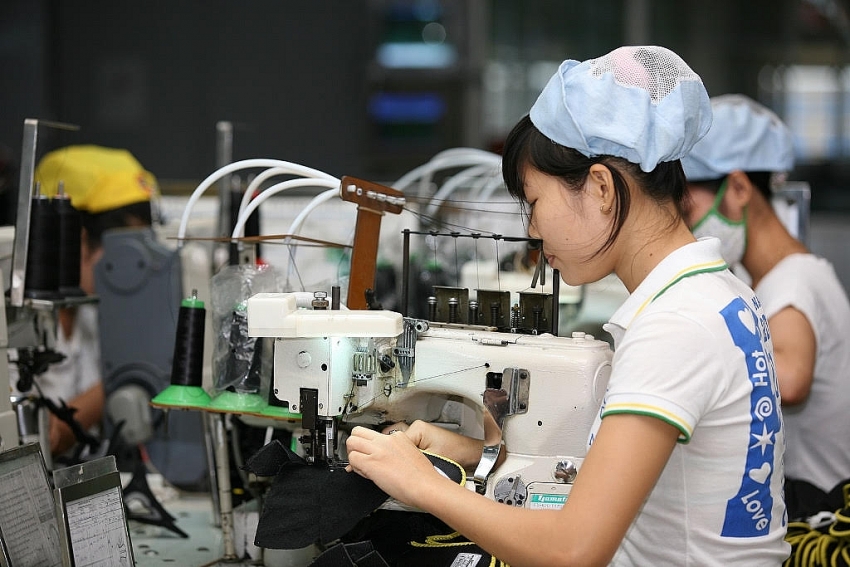 Many firms in Taxation is a major component of the state budget revenues and as the country’s budget deficit increases, taxpayers and enterprises will continue to face increased scrutiny from tax authorities trying to meet their revenue targets. In a bid to curb tax evasion and swell state budget, the government stated in its recently-released Resolution 01 on major solutions to boost socio-economic development in 2018 that in addition to trimming unnecessary recurrent spending, authorised agencies must apply measures to ensure the nation’s financial health, including tax inspections, audits, and examinations. The General Department of Taxation (GDT) has issued Official Letter 5339/TCT-TT directing local tax offices to create a tax audit plan for 2018. Taxation is a major component of the state’s budgetary revenue and as the country’s budget deficit increases, taxpayers and enterprises will continue to face increased scrutiny from tax authorities trying to meet their revenue targets. In a bid to curb tax evasion and the swell state budget, the government stated in its recently-released Resolution 01 on major solutions to boost socioeconomic development in 2018 that in addition to trimming unnecessary recurrent spending, authorised agencies must apply measures to ensure the nation’s financial health, including tax inspections, audits, and examinations. Under GDT’s directions, local tax officials will be conducting on-site tax audits of at least 18.5 per cent of taxpayers under each local tax office. This is an increase from 2017’s target of 18 per cent. In addition, at least 1 per cent of taxpayers will face tax inspections, while the remainder will be subjected to tax examinations. The taxpayers facing tax audits will be selected based on the tax probable risk system (TPR) system. The TPR system analyses taxpayers risk information for conducting tax audits. As per the Official Letter, tax audits will mainly focus on taxpayers who claimed refunds on value added tax (VAT) and those involved in sectors with significant revenue. The latter group includes oil and gas, petroleum, private hospitals, airlines, credit institutions, pharmaceutical companies, hotels and casinos, lottery companies, seaports, airports, and multinational companies. Besides, tax audits will also focus on firms involved in investment project transfers, capital transfers, and franchising; enterprises with numerous transactions with related parties, including ones who have reported continuous losses or lower profit margins than other enterprises in the same sector. Moreover, tax audits will also centre on companies engaged in upcoming sectors, such as multi-level trading companies, gaming, and digital technology-based services. Furthermore, tax audits will also target other sectors, including real estate, construction materials manufacturing, natural resource exploitation, FMCG, and automobile manufacturing/trading. According to Asia Briefing, a subsidiary of pan-Asia consulting firm Dezan Shira & Associates, with growing scrutiny from tax authorities, firms need to have a tax risk management system in place to help identify risky tax areas in an organisation. “Once identified, they need to evaluate them to understand the effects and likelihood of occurrence and managing risks to minimize tax exposure,” Asia Briefing said in a bulletin on tax audits in “With regulators and tax officials taking an aggressive approach in 2018, firms and taxpayers should be proactive in nature to reduce compliance costs and tax exposures.” How a ‘fake doctor’ swindles $21mn from 500 Vietnamese rich-wannabes More than 500 Vietnamese have been duped into joining and losing a hefty amount of money to a fraudulent ‘how to get rich’ scheme run by an unsuccessful businessman who claimed to hold a PhD. Pham Thanh Hai, 52, managed to swindle more than VND476 billion (US$20.97 million) from 508 people by encouraging them to invest in ‘lucrative businesses’ that would yield easy money, according to the Hanoi People’s Procuracy. Prosecutors have finished their probe into the case and decide to file charges against Hai for “swindling and appropriating assets” as per the Penal Code. Failed businessman turn ‘teacher for rich-wannabes’ Hai used to be the chairman and CEO of a private company called IDT, registered and headquartered in The company had been struggling with its internet-based business until 2008, when Hai decided to take advantage of its legal entity to mobilize investment from individuals for his personal purpose. He then set up a website and social media page called 'hoclamgiau.vn' (Learn to get rich), and organized different conferences on the theme to lure people into investing in his bogus projects. Hai then introduced himself as a PhD with extensive experience in doing business in the former Even though IDT did not conduct any real business, Hai promised to pay his ‘investors’ interest rates of 40%-50% a year, and offered high commissions of up to 10% to those who introduced new members to the network. Hai, in the name of IDT chairman and CEO, used the company’s seal in the investment authorization contracts he signed with investors to win their trust. The trick enabled him to mobilize more than VND2,725 billion (US$120.04 million) in only a year from October 2014 to October 2015. Hai only used a meager sum of VND114 billion (US$5.02 million) from this to put into real investment projects, with the remainders spent on his personal uses, paid interests and commissions to the investors and funded the ‘hoclamgiau.vn’ activities to expand its network. According to investigation results, none of the investment projects Hai channeled his money to were as profitable as he promised to investors. None of these projects were run by IDT as Hai claimed with his victims. As the network expanded, Hai had to spend a few hundred billion dong a month to afford payments to his investors, and had to try hard not to let the network collapse as investors would realize they were fooled and notify authorities. Hanoi prosecutors said Hai is now incapable of paying his investors, with 508 people demanding that he compensated them a total of VND594 billion (US$26.17 million) for the VND476 billion he swindled of them. Why foreign banks are turning tail and pulling out of Vietnam HSBC, Standard Chartered and BNP Paribas are just some of the institutions that have joined a mass exodus. Foreign banks concerned about high bad debt ratios and poor risk management in The most recent case was Standard Chartered Bank, which sold its entire 8.75% stake in Standard Chartered had previously withdrawn its representatives from ACB’s board of directors for unspecified reasons. Late last year, Also in 2017, HSBC sold is majority 20% stake in Techcombank, while the Commonwealth Bank of Australia (CBA) offloaded a 20% stake in VIB. Economist Nguyen Tri Hieu said that foreign banks have accelerated their divestments from Explaining the reasons for the sell-offs, he said many international banks have been unsatisfied with their businesses in Vietnam because of high bad debt ratios and poor risk management at local financial institutions, and a non-transparent legal system. Meanwhile, other lucrative markets have sought ways to draw their investment. “The business environment in Most foreign banks have invested in A high ratio of non-performing loans has also contributed to reducing the attractiveness of Vietnamese banks, he said. Bad debt in Vietnam's banking sector, mostly incurred due to a slowdown in the country’s real estate market in the early 2010s, had been cut to 2.34% by the end of September 2017, down from 2.46% at the end of the previous year, according to the central bank. A low foreign ownership cap is another reason for the capital withdrawals by foreign partners, who have been waiting for the limit to increase for many years now, economists said. The 30-percent cap covers total foreign shareholdings and limits a single foreign strategic investor to a one-fifth stake in a local bank. This has proved unattractive for many foreign lenders who see little incentive in a minority share and limited control of banks requiring restructuring and recapitalization. A limit increase would help retain foreign investors, many economists concluded. Some other experts and industry insiders said the foreign capital withdrawal is individual and normal moves. It is not a trend. Foreign banks could leave a market for a new one when having new business strategies. For example, Australian lender ANZ sold its retail business in Farhan Faruqui, ANZ's international group executive, said in a statement that the sale will allow the bank to focus its resources on institutional banking, its “largest business in “We will be maintaining our presence through our institutional bank in Nguyen Dinh Tung, CEO of the Orient Commercial Bank (OCB), said, “Banks leave markets where their business is ineffective or competition is too fierce. This happens not only in 2018, pivotal year for start-up nation building Prime Minister Nguyen Xuan Phuc has delivered a strong commitment to building a righteous government who facilitates, acts, and serves businesses and people. Tran Thi Binh Minh, deputy director of the municipal Department of Planning and Investment, said, “The city will set up start-up support centers. These centers will offer advices and connect projects with investment funds.” Vu Tien Loc, President of the Vietnam Chamber of Commerce and Industry, said 5 years from 2016 to 2020 are designated as start-up nation years. “Start-up has become a movement and trend of Economist Pham Chi Lan called on enterprises to map out sustainable development strategies and steady steps to take advantage of this revolution. She said, “Technology should serve sustainable development goals. The most important infrastructure of the digital era is database. Vietnamese enterprises, mostly run by young people, should work with each other and with other partners.” ROK at forefront of foreign investors in Vietnam The Republic of Korea (ROK) is the largest foreign investor present in According to the Ministry of Planning and Investment, there are 24,941 valid FDI projects with a total registered capital of US$320.3 billion from businesses across 125 countries and territories. The ROK tops the list with registered capital of US$58.1 billion, making up 18.1% of total investments, followed by Foreign businesses have invested in projects in each of the 63 provinces and cities nationwide, Up to January 20, Vietnam licensed 166 new projects with registered capital of US$442.59 million (just 35.6% of last year’s figure) and 61 existing ventures registered an additional investment level of US$456.78 million in their total capital (up 155% on the corresponding period of last year). The general picture shows the total of newly-registered and additional investments and foreign investors' capital to buy shares of Vietnamese businesses reached US$1.255 billion in January, or 75.9% of last year’s figure for the same period. The disbursement of FDI reached US$1.05 billion, a year-on-year rise of over 10%. Garment exports to Despite receiving huge imports of materials from Economic experts say the fact that the average annual growth of exports has held at over 20% for the past three years. According to the statistics of the General Department of Vietnam Customs, import value of textile and garment materials from The Vietnam Textile and Apparel Association (VITAS) forecasts that it will be easier for the association to ship greater numbers to China from 2018 as a result of drastic growth in Chinese, Russian and Cambodian markets. Especially, exports to Vu Duc Giang, Vitas president, has analyzed the contributory factors to the increase and concluded that In addition, the Regional Comprehensive Economic Partnership (RCEP) between ASEAN and the six countries of China, the ROK, Japan, India, Australia, and New Zealand which is currently under negotiation will also give a wealth of create solid opportunity for Vietnam to boost its exports to China. By the end of 2017, Le Tien Truong, General Director of the Vietnam National Textile and Garment Group (Vinatex), says Vietnamese businesses say that With a firm grasp of the necessary steps to greater market penetration and the short-term and long-term investment programs, Agricultural exports flourish in first months of 2018 Agroforestry and seafood exports likely reach an estimated US$2.6 billion in February, bringing the two-month total export value of the year to US$6.1 billion, up 30.2% year on year, according to the Ministry of Agriculture and Rural Development. In contrast to exports, the country spent US$5.29 billion importing agricultural materials. Consequently, the first two months’ trade surplus stood at US$819.3 million. In the reviewed period, agroforestry and seafood products reported vigorous export growth, with agricultural products growing by 27.8% to US$3.3 billion, seafood by29.5% to nearly US$1.2 billion, and forestry products by 28.5% to US$1.43 billion, and by 101% for other products. Since early this year, exports of many agricultural products such as rice, coffee, tea, cashew nut, fruit and vegetables, and cassava and cassava products have shown strong indicators of an upward trend in both volume and value. Cashew nuts achieved the highest export growth among agricultural products at 54,000 tons with a value of US$555 million (up over 73% in volume and nearly 95% in value). Vietnam face a number of difficulties last year, particularly the European Commission (EC)’s issuance of a "yellow card" warning for the country’s failure to demonstrate sufficient progress in its fight against illegal, unreported, and unregulated (IUU) fishing worldwide. Despite these hurdles, seafood exports still hit US$8.317 billion, exemplifying the seafood sector’s strong growth. With the subsequent impressive performance of 2017, businesses gave a boost to seafood exports from early this year as shown by the biggest ever consignment of seafood products worth more than US$590 million shipped via Cai Lai Port. The batch included a 20-ton container of frozen shrimp valued at more than US$290,000 for transport to Although the EU was the largest importer of Vietnamese seafood soaring by 32.9% over two months, Based on the results of 2017 and over the first two months of this year, Nguyen Ngoc Oai, acting general director of the Directorate of Fisheries, says the US$9 billion seafood export target set for this year is a realistic aim. This year, the seafood sector will continue to fully exploit profitable marine resources such as shrimp and tra fish by prioritizing hi-tech seafood farming models, speeding up intensive processing, and increasing added value products. The major focus will be on dealing with the problem of removing market and trade barriers and having the EU’s yellow card rescinded. Price of cashew nuts surges high during Tet The average price of cashew nuts increased by VND30,000 per kilo to VND280,000 as many processing plants in Binh Phuoc province have bought a large quantity of raw cashew nuts to meet the increasing demand during the traditional Lunar New Year (Tet) while supplies were limited. The Ministry of Agriculture and Rural Development says the price of cashew nuts will continue upward trend due to limited supply in the crop period. Cashew nut exports jumped 73% in volume to nearly 31,000 tons and 94% in value to US$317 million in January this year. The average export price hit US$10,254 per ton, up 1.3% compared to December last year. The With an export value of US$3.52 billion last year, Thai Binh begins $24.6m auto parts factory Construction on a US$24.6-million auto parts factory is under-way in the northern Financed by the Japanese Toyoda Gosei Group, the 11.3ha-factory will manufacture airbags and leather steering wheels which will be mainly exported to Japan, the US and Europe. Work on the factory kicked off early this month, baodautu.vn reports. Once operational, the factory is expected to create about 1,500 local jobs. The company said it believes that the project will contribute to accelerating the development of Established in 1949 and headquartered in Viet Tien Garment targets $13.6 million profit Viet Tien Garment JSC, one of the leading companies in the garment-textile industry in To realise this target, the company will take measures to improve the efficiency of investment projects, expand investment and shift towards green production, vietnamplus.vn quoted its general director Bui Van Tien as saying. The company will invest in new production technologies, particularly automation, and business administration. The company will launch campaigns to enhance productivity, encourage efficient practices, and increase the added value of products, as well as improve income and working conditions for employees while developing brands and distribution channels, striving to become a multinational economic group. Last year, Viet Tien earned VND14.1 trillion ($627.1 million) in revenue, up 11.4 per cent. Of which the parent company recorded VND8.29 trillion, up 12 per cent and its subsidiaries grossed VND794 billion, up 1.5 per cent. Pre-tax profit hit nearly VND695 billion, while export turnover was estimated at $871 million, of which revenues from the Japanese market made up 32 per cent, the US 22 per cent, and the EU 17 per cent. VN goods on show at Gulfood 2018 Twenty four Vietnamese enterprises are displaying their farm produce, foodstuff and beverage at Gulfood Dubai 2018 – the world’s largest annual food and hospitality exhibition. Gulfood, which is taking place at the Dubai World Trade Centre in the United Arab Emirates (UAE), attracts the participation of over 5,000 local, regional and international exhibitors and and 97,000 attendees bearing witness to the food industry’s latest trends and technology. The four-day exhibition event, which wraps up on Thursday, is described as a good opportunity for Vietnamese firms to advertise their goods to international customers and seek new trade partnerships. This is the fifth consecutive year Plastics export turnover to increase by 15% Exports of plastics are expected to grow by 12–15 per cent this year, according to the Viet Nam Plastics Association (VPA). Ho Duc Lam, chairman of the association, said the country’s key export markets this year would be Other markets such as Plastic bags made in Every year, the average US import turnover is more than US$50 billion for plastics and plastic products, accounting for 9.1 per cent of the world’s total import of plastics, according to VPA. The largest plastic export market is Lam recommended that Vietnamese plastic producers prepare long-term strategies and invest in market research to increase their penetration into the Japanese market. In addition, the EU’s demand for plastic products imported from Despite the high export prospects and strong development in recent years, the plastics industry is still known only as part of the plastic processing industry. More than 80 per cent of raw materials are still imported from other countries. Each year, the plastic industry needs an average of four million tonnes of raw materials, but only manages to produce about 900,000 tonnes, with the rest imported. Experts have said that a shortage of raw materials will reduce the competitiveness of exporters. Because of regulations on the origin of goods, it is difficult to take advantage of tax incentives in free trade agreements. Exporters also need to focus on environmentally-friendly and safe products for sustainable growth. Becamex IDC to trade on UPCoMin February The Investment and Industrial Development Corporation (Becamex IDC) will trade more than 23.4 million shares on the Unlisted Public Company Market (UPCoM) on February 21. The firm’s shares will start trading at VNÐ31,000 (US$1.37) per share. On December 1, 2017,Becamex IDC put 311.2 million shares, or 23.6 per cent of its chartered capital, for sale at its initial public offering (IPO) but sold only six per cent of the shares. The company raised only VNÐ587 billion from its IPO, with foreign investors purchasing 56 per cent of the shares sold. One month after the IPO, Becamex IDC attempted to sell 296.4 million shares left over at its previous IPO, but the second attempt was also unsuccessful as the company was able to offload only 5.1 million shares, earning VNÐ158 billion. Thus, Becamex IDC sold a total of 24 million shares, or 7.7 per cent of the total shares offered for sale after two attempts, earning VNÐ745 billion. Under the privatisation plan for Becamex IDC, the company has VNÐ13.17 trillion in chartered capital. The company will offer 311.2 million shares in its third IPO, while a quarter of its capital will be sold to strategic investors and 0.4 per cent stake will be transferred to its employees. The government will hold 51 per cent of the company’s chartered capital after it completes the equitisation process. Thaco opens plant to manufacture agricultural machinery Truong Hai Automobile Company (Thaco) has inaugurated an agricultural machinery manufacturing plant in the Chu Lai-Truong Hai Industrial Complex in the central province of Quang The plant, which took one year to complete, has been built in collaboration with Korean company LS Mtron. Thaco said the manufacturing plant, which was built under a cooperation agreement signed in 2017, aimed to provide made-in-Viet As planned, Thaco will be the exclusive agent of LS Group’s farming machinery’s distribution and production in Thaco and LS Mtron under the LS Group in The LS Group has two LS cable and system factories in Dong Nai and Hai Phong and LS Mtron has an electronic components factory in Meanwhile, Thaco and other partners have invested VND7.8 trillion (US$345 million) in an agriculture production project in the north of Thaco has manufactured and distributed vehicles of foreign brands – Kia of South Korea, Mazda of Japan, France’s Peugeot and BWM of Germany. As many as 26,037 cars were sold in January, marking a year-on-year increase of 28 per cent, reports the Vietnam Automobile Manufacturers’ Association (VAMA). Of this, the sale of passenger cars grew 25 per cent to 18,371 units, while the volume of commercial cars and special-purpose cars reduced by 38 per cent and 78 per cent to 7,363 units and 303 units, respectively. VAMA’s report shows that the volume of locally-manufactured cars reached 20,586 units, up three per cent compared to the previous month, while 5,451 imported cars were sold, down 30 per cent. The main reason for the sharp decline in the import of complete built-up units was Decree 116, which came into effect in January. This decree tightens control over quality, technical safety and environment protection of imported autos. This is why many automakers, such as Ca Mau hopes crabs are the next big thing The southernmost Last December the province unveiled a programme to boost sea crab farming to VND2.3 trillion (US$101 million) worth of harvests a year by 2020. The crab farming area will be expanded to 100,000ha by 2020 with average productivity of 70-80 kilogrammes per hectare and annual output of 12,000 tonnes. Ca Mau has many advantages that aid its aquaculture plans including the sea on three sides, a coastline of 254km and 87 river mouths. It also has 100,000ha of mangrove forests, which are a good habitat for raising shrimp, fish and crab. Crab farming has been growing in the Cuu Long ( The biggest wholesale crab market in the delta is located in Nam Can District in Ca Mau. The market attracts hundreds of traders every day who come to buy crab and other seafood coming from the province and neighbouring areas. There are around 50 local traders who pay a total of VND3 billion to buy 15 tonnes of crab on average per day. Another 20 enterprises also buy a large quantity daily. Most of the crabs are then resold to processing companies in About 70 per cent of live crabs with roe is exported by air; the rest is sold to consumers in the city and the delta. Though crab generates as high incomes and its market is as good as for backish-water shrimp, the price volatility is a big challenge for crab farmers in the delta. Two or three crops of crabs can be harvested in a year. The seventh and eighth lunar months are usually the time for the year’s second crab harvest, but it is a time when many people are vegetarian. Demand for crab drops leading to a decrease in crab prices. During this period crab with roe type 1, which refers to the best quality, falls to VND250,000 per kilogramme or sometimes even VND100,000. The prices of smaller crabs – weighing five or six to the kilogramme -- fall to VND150,000 and sometimes even to VND50,000-60,000. This causes big losses for farmers. The lack of efficient distribution channels also causes price volatility. If the country can better monitor the production and consumption of the crustacean and set up a good distribution network, crabs have the potential to become the biggest export item after shrimp and tra fish. President calls on India firms to do business in Viet Nam Speaking at a reception for Sengupta in Ha Noi on February 13, President Quang said the Government of Viet Nam is continuing with reform and improving business regulations to meet international standards and create favourable conditions for foreign investors. He said developing energy, particularly renewable energy, is a priority of The President asked Tata Group to fast-track the project and put the thermal plant into operation on schedule. President Quang spoke highly of Tata’s move to expand business operations to other fields in He hoped that enterprises from Sengupta informed President Quang about the Tata Group’s projects in He affirmed that Tata is working hard to complete these projects on schedule and wants to expand to other fields in Found in 1869, Tata Group is one of VNN |
↧
Article 1
Seven-year-old donates cornea, thousands touched Nguyen Hai An, 7, of Hanoi’s Nam Tu Liem District, took her last breath on February 22. But before she passed away in her K Hospital sickbed, she and her mother agreed that she would give her cornea to children who could use it.
An became the second-youngest person to donate a cornea in the country so far. The little girl, who had fought astrocytomas since September 2017, nodded without hesitation after her mother said she wanted to continue to see An’s eyes in the coming years by giving An’s cornea to other children. Astrocytomas are tumours that arise from astrocytes—star-shaped cells that make up the “glue-like” or supportive tissue of the brain. The tumours are “graded” on a scale from I to IV based on how normal or abnormal the cells look. There are low-grade astrocytomas and high-grade astrocytomas. Low-grade astrocytomas are usually localised and grow slowly. High-grade astrocytomas grow at a rapid pace and require a different course of treatment. Most astrocytoma tumors in children are low grade. Pham Thi Viet Huong, deputy head of the hospital’s Pediatrics Department, who directly treated An, said that when An was hospitalised last year, she was already in bad condition. An had severe headaches, paralysis on one side of her body and had to breathe via an oxygen tube, Huong said. “An is really a very good child,” Huong said. “She always obeys every request of the doctors for her treatment, although she had overwhelming pains due to the tumour, which a little girl could not bear,” Huong said. An was one of the most special patients Huong had met. “I could not forget the little girl with a sunny smile and bright eyes,” Huong added. “An’s tumour was so large that we could not use radiotherapy – the only strategy that might have rescued her at that time,” Huong said. Cornea taken and given Nguyen Huu Hoang, director of the Viet Nam National Co-ordinating Centre for Human Organ Transplantation, recalled the moment he came to An’s house to take her cornea as An and her parents expected. “The first moment I entered the house, An was cradled in her mother’s arms like she was sleeping tight,” he said. Hoang and his two colleagues tried to conduct the 30-minute surgery as gently as they could. An’s cornea later was preserved in the Bank of Eyes under the Ha Noi-based National Hospital of Ophthalmology before being transplanted for people in need. This was the second surgery Hoang and his colleagues had undertaken to take a cornea from a child. "But the surgery still ended with the doctors in tears," Hoang said. They felt deeply touched because An’s parents overcame the normal prejudice that people’s bodies should be complete when they die in order to donate An’s cornea, Hoang said. Not only the doctors but also thousands of other people had the same feeling of respect and gratitude when they heard An’s story, including Minister of Health Nguyen Thi Kim Tien. She sent a condolence wreath to An. Nguyen Hoang Phuc, deputy director of the Viet Nam National Co-ordinating Centre for Human Organ Transplantation, said, “Everyone can live the second life after he or she dies if he or she donates a part of their body to people who need it.” An’s cornea yesterday afternoon were transplanted to two people, including a 73-year-old person and a 42-year-old person after the consultation of the hospital’s doctors. The 73-year-old person has cornea scarring and the 42-year-old was born with a cataract. An’s cornea was very precious: a survey by the hospital showed up to 300,000 people need a cornea transplant, but only 100-150 people receive a cornea each year due to a national shortage. Law amendment proposal Nguyen Tran Thuy Duong, An’s mother, said first that she wanted to donate her daughter’s organ. Nevertheless, the current law did not allow it. The Law on Organ Donation only permits people above 18 years old to donate organs. So An alone couldn’t make the decision to donate her cornea. “I want to do that because I know many sick children who are in need of organ transplantation,” Duong said. Therefore, Phuc, the deputy director of the centre, said the centre would submit to the health ministry and the Government to amend the law in the coming time. The age of organ donator should be adjusted, he said. “If we do that, we will save more people,” he said. VNS |
↧
Article 0
 Vinamilk, for example, has spent VND2.4 trillion on its automatic production development program. At its factories, filling, pasteurizing, packing and loading products into pallets are implemented automatically, while carrying materials and finished products, and warehousing, are the work of self-propelled robots. At Vinasoy’s factory in Binh Duong province, the production line also runs automatically, while all the steps of the packaging process are undertaken by robots. Other enterprises, including URC, Habeco and CP, are using robots. Huynh Phong Phu from ABB said that robot demand in Only 200-300 ABB robots were sold in Realizing the great potential of the Vietnamese market, foreign manufacturers have been flocking to Many robot models were introduced at the annual exhibition on electronics assembling and supporting industries held in mid-October 2017 in HCMC. It was estimated that products bearing 500 brands from 25 countries and territories, including More recently, in mid-December 2017, a group of 12 South Korean robot manufacturers visited Phu of ABB believes that The good investment environment in Vietnamese robots In fact, After that, some models were introduced, but were mostly created for performance and entertainment. Some enterprises carried out robot R&D projects, but they were not sure about market demand. Vietnamese enterprises, which now have demand for industrial robots, have been importing robots in recent years. Tran Thanh Thuy, former deputy head of the Thanh Lich, VNN |
↧
Article 3
BUSINESS IN BRIEF 28/2 Two-month FDI disbursement up 9.7 percent Disbursement of foreign direct investment (FDI) increased by 9.7 percent to 1.7 billion USD in the first two months of 2018. The Ministry of Planning and Investment's Foreign Investment Agency also revealed that in the first two months of the year, Of this total, 1.83 billion USD came from manufacturing and processing firms, accounting for 54.6 percent of the nation’s total registered capital. Construction ranked second with 345.4 million USD and estate trading ranked third with 312.1 million USD. January saw nearly 1.25 billion USD of FDI poured into In 2017, FDI disbursement last year also reached a record high, increasing by 10.8 percent to 17.5 billion USD. Economy should shape Vietnam-India relations Economy should lie at the heart of India-Vietnam relations, according to an article posted on the Times of India on February 27 on the occasion of the upcoming visit to Titled “Move on Economics: The country’s gross domestic product (GDP) expanded 6.7 percent last year with the total volume of trade reaching a record 425 billion USD, of which exports accounted for 200 billion USD. These accomplishments were a direct result of economic reforms called Doi Moi that Doi Moi laid the foundation for This gave Today, All of these things make Bilateral trade hit 7.6 billion USD in 2017, representing a year-on-year rise of 40 percent. However, there is still room for growth, the article stressed. It emphasised that President Quang’s visit exemplifies the growing relationship between President Quang will be accompanied by a large group of entrepreneurs –demonstrating the economic aspect of the visit. In fact, President Quang is expected to witness the signing of bilateral Memoranda of Understanding regarding a joint venture on a coal terminal in The President will also preside over the launching ceremony of a direct air route between Crab price highest in 5 years The price of commercial crabs in The current price is double the price at the end of 2017. The price rose sharply before, during and after the Tết (Vietnamese Lunar New Year) holiday. During Tết, a kilo of crab was priced at VNĐ800,000, up by VNĐ400,000 compared to the end of last year. Huỳnh Thanh Hương, a farmer in Nhà Mát Ward, He said with the current price hike, farmers rearing crabs have gained high profits. According to the Meanwhile, provincial authorities have cautioned farmers to assess the situation carefully before investing in crab-rearing in the hope of making high profits. This will avoid over-supply in future, leading to a reduction in the current selling price. The authorities also suggested farmers not to rear low-quality crabs in poor production conditions, which will also lead to a fall in price. Bạc Liêu has an aquaculture area of some 130,000ha, most of which is used for farming shrimps and crabs. PetroVietnam faces challenges in 2018 The rapid exhaustion of its main oil discoveries is putting the Việt Nam National Oil and Gas Group, better known as PetroVietnam, under great pressure to reach its oil exploration and production targets for 2018. PetroVietnam produced 15.52 million tonnes of oil in 2017, surpassing its set target by 1.3 million tonnes. However, the country’s sole oil exporter has reduced its 2018 production target by one million tonnes, due to concerns over the depletion of natural oil resources. Its general director, Nguyễn Vũ Trường Sơn, acknowledged that most of the oilfields have been exploited for many years and are in their final stages, with production declining by 15-30 per cent per year. Bạch Hổ (White Tiger) field, the country’s largest and longest-producing oilfield, contributing about 60 per cent of the nation’s total oil production for PetroVietnam, is in a state of depletion and can only be explored in 4-5 years. In addition, the rapid flooding, at over 60 per cent, in many fields due to intensive exploitation, such as Hải Sư Trắng (White Sea Lion), Tê Giác Trắng (White Rhino), Sư Tử Vàng (Yellow Lion) and Rạng Đông (Dawn), is posing a challenge that may reduce oil production in the coming years, Sơn said. According to Vietsovpetro’s general director, Từ Thành Nghĩa, the largest problem facing the company is the sharp decline in output at its major oilfields, such as at Bạch Hổ and Rồng (Dragon), while new discoveries, such as Gấu Trắng (White Bear) and Thỏ Trắng (White Rabbit), are small fields with low reserves. Therefore, the production plan of four million tonnes of oil per year remains a large challenge for the Russian-Vietnamese oil and gas exploration joint venture, Nghĩa said at PetroVietnam’s conference to set 2018 tasks. The year 2017 proved to be the most difficult year for PetroVietnam’s exploration activities, when oil reserves increased by only four million tonnes, which was much lower compared to the strategic target of 28-42 million tonnes per year. In previous years, PetroVietnam often invested over US$2 billion to drill 30-40 oil wells and replenish its oil reserves by 35-40 million tonnes per year, but from 2015 onwards, investments from the group and its foreign partners have decreased by five times. “It all started with exploration,” said Nguyễn Quỳnh Lâm, PetroVietnam’s deputy general director, who is in charge of exploration activity. Lâm said weak exploration would lead to oil shortages for other activities, including petrochemical refining, electricity and fertiliser production. He expected the Government would soon approve the group’s financial regulations, allowing it to extract money for the exploration fund. While awaiting the Government’s approval, Lâm said PetroVietnam would continue to call for foreign funds for developing some oil and gas fields, and would give up its executive role, in exchange for needed capital. Ngô Hữu Hải, PetroVietnam Exploration and Production Corp’s (PVEP) representative, said the company currently lacked at least $150 million for exploration activity in 2018. Its production target this year would also decrease by about one million tonnes of oil equivalent. Hải said the company was implementing measures to improve the financial condition and rank projects to restructure its project portfolio, as well as break or relax investment agreements, along with reducing costs. Close to 20 businesses from The event created an opportunity for Vietnamese firms to learn about Participants agreed that the demand for healthy and environmentally-friendly agricultural products will become an inevitable trend in the coming time in many countries, especially developed nations. Executive Director of Ecolink Pham Minh Duc said his company has successfully brought clean O Long tea grown in He hoped to share his experience with policymakers through this forum to help them devise more proper financial and policy mechanisms to develop The ministry will promulgate appropriate policies to help production units and associations to speed up the development of organic agriculture and maintain ecological balance, especially in the light of international economic integration and climate change adaptation. According to the Vietnam Organic Agriculture Association, the organic farming area in the country has been increasing, reaching about 77,000 hectares in 2016, 3.6 times higher than it was in 2010. Currently, 33 out of the country’s 63 provinces and cities have organic farming models, with many offering high economic efficiency and higher incomes for farmers, contributing to agricultural restructuring. Though it is modest compared to the total farming area, businesses and organisations are applying international organic standards and certified organic products are being exported to many markets, including the US and EU. Organic agriculture offers advantages such as no pesticide residue, higher value of products, and greater likelihood of being accepted in choosy markets.- Bac Ninh attracts over 130 mln USD of FDI capital in two months About 130.29 million USD of foreign direct investment (FDI) has been poured into new and existing projects in the Of the total capital, 91.69 million USD has been channelled into 21 new projects while the remaining has been added to 35 existing ones, according to the Bac Ninh Industrial Zones Authority. The authority noted the businesses with new investment mainly operate in the processing and manufacturing sectors. It said the province has been working to boost the application of high technology in local industries, develop supporting industries to serve key sectors, and connect Bac Ninh businesses with FDI firms. The provincial administration has also held regular meetings with enterprises to remove difficulties, thus promoting investment attraction in industrial parks and clusters. A business support team was also set up to immediately address problems facing companies whenever it receives information. Meanwhile, the province has overhauled relevant mechanisms and simplified administrative procedures in the fields with many problems arising such as land, construction, labour and customs so as to create the best possible conditions for businesses. So far, the authority has granted 1,228 investment certificates, 810 of which to FDI companies, with total new and additional capital of over 16.75 billion USD, including more than 14.8 billion USD of FDI projects. Bac Ninh, an industrial centre of 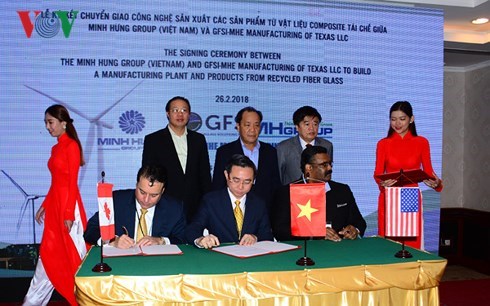 GFSI-MHE Manufacturing of Texas LLC from the US and Minh Hung Group will join hands to construct a plant to manufacture products from recycled fiber glass under a contract inked in Ho Chi Minh City on February 26. Accordingly, GFSI-MHE Manufacturing of Texas LLC will transfer technology of producing goods from recycled fiber glass to Minh Hung Group. The advanced technology will help recycle a huge amount of waste, mostly used composite and fiber glass like plastic containers, aircraft and boat covers and distribution boards, while creating environmentally friendly materials, bringing in high economic efficiency. Lam Dao Hung, Chairman of Minh Hung Group, after technology transfer, both sides will build a plywood manufacturing plant in Tien Giang province with a total investment of 50 million USD. The plant is expected to be put into operation in 2019. The country is currently home to 35 solid waste treatment plants with total designed capacity of 7,500 tonnes per day. It discharges some 28.5 million tonnes of solid waste every year. Most of the solid waste is buried at high costs, affecting the environment and wasting materials for the recycling industry. Citi named Asia’s best digital bank by Asset Magazine Citi has been recognised as Citi’s Asia Pacific Consumer Bank ended the fourth quarter of 2017 sustaining growth and profitability with the sixth consecutive quarter of revenue growth. For the full year 2017, Asia Pacific GCB’s revenues were up 7 percent at 7.3 billion USD and net income up 16 percent, according to the bank’s recent press release. During 2017, Citi invested further in supporting its digital transformation in In In the editorial write up, the Asset said, “Citi continued to enhance its digital offering by developing intuitive tools to serve their customers across its footprint, and saw a significant number of digital onboarding acquisitions with many clients using its various digital channels.” Lack of supporting industries highlighted More efforts should be made to develop supporting industries in The current dependence on imported materials has cost Vietnamese companies their competitiveness even in the domestic market, the newspaper said. Businesses in Nearly all garment companies import a significant ratio of their raw materials due to the low production by supporting industries. Most companies in supporting industries are small- or medium-sized so they face difficulties such as lack of funds and modern technologies and equipment. Not surprisingly they are unable to compete with companies in other ASEAN member countries, an industry spokesperson said. Nguyen Phuong Dong, deputy director of DoIT, said the city would speed up restructure of supporting industries. Industrial parks and export processing zones in the city usually lease out sites of 5,000 square metres to a few hectares to attract big companies and reduce infrastructure cost whereas supporting industry companies only require small pieces of land, he said. To resolve this problem, in 2015 the People’s Committee approved the construction of dedicated industrial parks for supporting industries at the Sai Gon Hi-Tech Park, Tan Thuan – Linh Trung Export Processing Zone, and Hiep Phuoc Industrial Park. Measuring one to four hectares, these will be divided into small lots of between 300 square metres and 5,000 square metres to meet the needs of the small- and medium-sized companies that make up supporting industries. A shortage of funds for investment in production is another problem facing domestic firms in supporting industries, hitting their competitiveness. Higher land rents in The average rent in the city is US$100 per square metre compared to $50 in surrounding places like Binh Duong, Dong Nai, Long An and Tay Ninh. DoIT is planning to develop an industrial park for supporting industries using public money and rent out land at $50-60 per square metre, Dong said. The city government would offer loans of up to VND200 billion ($9 million) for projects designed to develop supporting industries, he said. Kienlongbank appoints new general director Kien Long Commercial Joint Stock Bank’s (Kienlongbank) board of directors (BOD) has appointed Tran Tuan Anh the new general director. Anh, who assumed office on February 24, was previously Kienlongbank’s deputy general director. Anh has replaced Vo Van Chau, who was appointed BOD’s vice chairman cum general director on February 13, 2018. However, BOD decided to dismiss Chau from the position of the general director so that he could focus on his role as the vice chairman and set up an orientation plan for the 2018-22 period along with BOD members. Born in 1976, Anh has a bachelor’s degree in banking and finance as well as a master’s degree in law. She is a graduate of HCM City University of Law. She has earlier held positions such as deputy head of the Department of Real Estate Services, head of the Legal Department of HCM City Development Bank of Anh joined Kienlongbank on October 8, 2013, as an assistant to the chairman. On July 2, 2014, she was appointed the deputy general director cum director of the Legal and Debt Settlement Department. On May 9, 2016, she quit the latter position but continued as the deputy general director. By the end of 2017, Kienlongbank’s total assets reached over VND37.35 trillion (US$1.64 billion), a year-on-year increase of 22.67 per cent. The pre-tax profit of the bank reached nearly VND260 billion, up 71.2 per cent compared to 2016. TTC energy segment inks EPC contract with Sharp led consortium Gia Lai Electricity JSC, a member of TTC Group, on February 23 signed an engineering procurement and construction (EPC) contract to implement Phong Dien Solar Power Plant in Thua Thien-Hue Province with a consortium comprising three contractors - Sharp Group (Japan), Sharp Solution Asia (SSSA, Thailand) and NSN Construction and Engineering JSC. Sharp Group of After this EPC contract comes into effect, the consortium of Sharp – SSSA – NSN will officially become the contractor of the Phong Dien Solar Power Plant, which has a capacity of approximately 35MW and an estimated power output of 61,570MWh per year, nearly equaling the annual power consumption of around 32,628 households in Once completed, the plant will significantly contribute to promote local socio-economic development and add more renewable energy sources to the national grid system. Specifically, it will help reduce an estimated 20,503 tonnes of CO2 emissions per year, contributing to environmental protection, as well as global efforts to limit global warming. Nowadays, utilisation of green - clean energy source is a big innovation in the energy industry that brings the optimal solution to save power and positive effect to the environment. Solar power is becoming a sustainable development trend in the future and contributing to preserve the limited energy resources for the world. The TTC energy segment, with its main unit being Gia Lai Electricity JSC, has relentlessly boosted investment in clean energy resources and implemented pilot wind and solar power models in some potential localities, besides investing in hydro power projects. TTC plans to achieve the capacity of 1,000MW of solar power and 40MW of wind power, accounting for 73 per cent of TTC energy segment’s total power capacity, and 222MW of hydro power and 150MW thermal power, accounting for 16 per cent and 11 per cent of its total power capacity by 2020. Previously, TTC planned to deploy 20 solar power projects in several provinces, including Tay Ninh (324 MW), Binh Thuan (300 MW), Ninh Thuan (300 MW) and Gia Lai (49 MW), with a maximum investment of up to VND20 billion (US$987,555) per MW, an IRR (internal rate of return) of at least 15 per cent and payback period of less than 12 years. Signing EPC contract and corporating with Sharp – SSSA – NSN is a milestone for the TTC energy segment to leverage each other’s strengths for effective co-operation and development and increase benefits for the community in the context of climate change in This also provides the foundation for TTC energy segment to complete its clean energy development roadmap and expand the scale of operations in line with international standards. This is also a solution to help TTC is a multi-industry corporation with nearly 40 years of operation, consisting of four corporations, one segment, and over 150 subsidiaries and joint companies. It has investments in several industries including real estate, energy, agriculture, education and hospitality. Mongolian South Gobi boosts ties with Quang Binh The visiting delegation from Mongolia’s South Gobi province led by its vice governor Batbold Khoroo and Quang Binh provincial leaders on February 26 discussed ways to step up bilateral cooperation in tourism, construction industry and training of overseas students. Addressing the meeting, Mr Khoroo briefed the host on He expressed his desire that the meeting will kick-start long-term cooperation between the two localities in the future. Vice chairman of the Quang Binh provincial People's Committee Tran Tien Dung highlighted the existing sound relations between He showed his delight at Tien also assured Quang Binh's readiness to provide The Vietnamese government has issued a resolution on socio-economic and budget management in 2018 focusing on achieving GDP growth target, promoting economic restructuring, and reforming growth models. The Prime Minister has recently asked ministries and sectors to implement mechanisms to attract high-quality human resources to high-tech zones and protect business investment in Socialist-oriented economic reform has made There are three high-tech parks in The high-tech parks are intended to boost the development of high technology to serve local socio-economic development. During a recent visit to the The Prime Minister asked ministries and sectors to issue guidelines, address obstacles, and revise the Law on High-Technology to boost the development of high-tech parks. "Policies and mechanisms need to be specified to attract researchers to hi-tech parks. You should identify obstacles and submit a list to Deputy Prime Minister Vu Duc Dam who will then discuss them with leaders of the Ministry of Finance, Ministry of Planning and Investment, and Ministry of Science and Technology. The Prime Minister is ready to address legal obstacles and will discuss them with other cabinet members to work out incentives to attract talents to high-tech parks. This issue is of great importance to building a startup ecology in 2018 will be a turning point in Tra fish prices hit record high amid material shortages The prices of tra fish (pangasius) in the Mekong Delta is hitting a record high, exceeding 30,000 VND per kilogramme, bringing high profits to local farmers, but businesses are facing shortages of material fish. A representative of a seafood processing firm in Chau Doc city of Duong Nghia Quoc, Chairman of the Vietnam Pangasius Association, said even owners of breeding farms are short of material tra fish due to a lack of breeding tra fish stocks. The supply of material tra fish for export in 2018 will be limited, he said, adding that the prices of exported tra fish may remain high for the whole year. Hanoi records 109 million USD in FDI in Jan-Feb The People’s Committee also said that the city posted good growth in many sectors, including industrial production, sales of goods and services, import-export and tourism. The committee’s Chairman Nguyen Duc Chung requested relevant agencies to continue creating favourable conditions for investors. He said the city ensured a joyful and safe Lunar New Year holiday for residents, noting that local agencies and authorities promptly set to work immediately after the holiday. The chairman announced that the People’s Committee will conduct an inspection of operations at all public offices of the city, in order to prevent delay in handling documents, especially in sensitive fields such as planning and investment. The city will also accelerate the launch of more online public services, focusing in the fields of justice, labour and social affairs. Other tasks include the planting of trees to realise the target of 1 million trees along streets and in parks and public places, and the development of diverse tourism products. The capital city welcomed nearly 375,000 visitors during the week-long Tet (Vietnamese New Year) festival from February 14 to 20, including 120,000 international tourist, up 13 percent and 30 percent, respectively from the same period last year. The local tourism industry estimated to earn more than 1.28 trillion VND (56.5 million USD) during the biggest holiday of the year, up 19 percent year on year.- Standard Chartered VN allowed to increase charter capital The State Bank of Viet Nam (SBV) on February 22 issued document No. 1104/NHNN-TTGSNH to allow Standard Chartered Bank (Viet Nam) Limited to increase its charter capital. The plan to increase the charter capital from VND3.08 trillion (US$135 million) to VND4.215 trillion, was approved by the owner through the resolution approved on September 28, 2017. SBV requires Standard Chartered Bank to build and control credit growth, in accordance with the bank’s plan but not exceeding credit growth targets announced by SBV. In addition, the Governor of SBV requests the bank to increase its capital in line with the current provisions of the law. After increasing the capital, Standard Chartered Bank will be responsible for submitting the application for amendment of charter capital in the licence to SBV. This document is valid for 12 months from the signing date. If the increase of chartered capital has not been completed within the permitted time limit, this document shall be invalidated. Trade counsellors praised for helping boost VN exports Localities and businesses appreciate the efforts made by Vietnamese trade counsellors in helping the country’s businesses boost their exports, and want them to continue providing information in a timely manner. Speaking at the 2018 Trade Counsellor Conference held in HCM City on February 26, Truong Quang Hoai Nam, Vice Chairman of the Can Tho People’s Committee, said his city’s exports last year increased by 15 percent over 2016. “In addition to efforts made by businesses themselves, trade counsellors contributed to the success of the city’s exports by providing them with information.” Deputy Minister of Industry and Trade Tran Quoc Khanh said “There was certainly a contribution by trade counsellors, who besides helping businesses promote their products abroad, also verify information about their partners and provide support in case of trade disputes,” he said. But there were still shortcomings in the system, and the biennial conference was held to review the previous two years and set goals for the next two, he said. Delegates said information provided by trade counsellors in both directions was sometimes too general. Besides, they sometimes stop at providing just addresses and phone numbers of businesses, he said. “We need quick information and early market forecasts. We only get the information that the The city and its businesses want to take part in trade fairs to promote its key products like seafood and rice, so trade counsellors and trade offices should evaluate trade fairs to tell businesses which ones they should participate in, according to him. Lam Van Bi, Vice Chairman of the Ca Mau People’s Committee, suggested trade counsellors provide more precise market forecasts and information about technical barriers and competitors. Nguyen Ngoc Hoa, Deputy Director of the HCM City Department of Industry and Trade, wanted trade counsellors to help promote exports of key products like garment and textile and electronics. The Ministry of Industry and Trade should organise seminars and conferences to enable businesses to understand more about CO (certificate of origin) and consumer habits in foreign markets, he said. The city was focusing on developing infrastructure and logistics, and trade counsellors should help find investors in those sectors, he added. Nguyen Canh Cuong, “We will be pleased to connect businesses and localities that have demand for logistics development with Speaking about risks like trade disputes and online frauds, he said, “If businesses receive suspicious emails, they can contact the trade office to verify.” According to Nguyen Hoang Thuy from the Vietnam Trade Office in Vietnamese exports to the market have increased significantly but still remain low compared to potential. Vietnamese businesses need to focus on improving product quality, diversifying export items, increasing export of value-added products and building brands for their products. The conference was followed by a direct meeting between businesses and trade counsellors in the EU, Americans, Asia and Finance Ministry asked to implement tasks from year’s beginning National Assembly Chairwoman Nguyen Thi Kim Ngan urged the Ministry of Finance (MoF) to perform its tasks right from the beginning of the year as 2018 is very important for the fulfillment of targets and plans for 2016-2020. While working with the ministry’s leaders in In 2017, budget overspending, public and foreign debts were controlled, financial disciplines were ensured and the financial policy was tightened, she said. Obviously, budget overspending declined thanks to the implementation of the national five-year mid-term financial plan in 2016-2020, she noted. As the MoF will be the only agency in charge of public debt management from July 2018, Chairwoman Ngan asked the ministry to actively coordinate with relevant agencies to well perform this task. She also required the ministry to improve the management of incomes from equitisation and divestment, reorganise businesses under its management, enhance the management of budget collections under the law, and limit financial funds to focus resources on the State budget. Minister Dinh Tien Dung affirmed that in the coming time, his ministry will continue to tighten financial disciplines and resolutely maintain national financial plans, considering it an important mission, while effectively implementing Resolution No. 25/2016/QH14 on the national five-year financial plan in the 2016-2020 period. The ministry will restructure its apparatus in the fields of tax, treasury and customs right from the year’s beginning, he added. Vietnamese, Chinese provinces foster cooperation Senior officials of four border Vietnamese province and The February 23-24 meeting, the third of its kind, saw Vice Secretary of the Party Committee of Quang Ninh province Do Thi Hoang, Secretary of the Party Committee of Lang Son province Lam Thi Phuong, Secretary of the Party Committee of Cao Bang province Lai Xuan Mon and Secretary of Party Committee of Ha Giang province Trieu Tai Vinh of Vietnam, and Secretary of the Party Committee of the Guangxi Zhuang Autonomous Region Peng Qinghua. Also on the occasion, the ninth session of joint working committee of the four border Vietnamese provinces and the Guangxi Zhuang Autonomous Region, and a business forum of the localities took place. At conferences and workshops within the framework of the New Year meeting, the Vietnamese and Chinese localities reviewed their cooperation since the second meeting last February in Ha Long city of They agreed to maintain the New Year meeting as an annual event, and exchange of visits to increase political trust among the localities. They also agreed that in 2018, the localities need to continue implementing common perceptions of the two countries’ leaders, deepening friendship exchanges and substantial cooperation, promoting the border areas' development and enriching the Vietnam-China comprehensive strategic cooperative partnership. The localities’ leaders consented to foster cooperation in trade, construction of cross-border economic cooperation areas, upgrade of border gates and markets, cross border labour management, justice, agriculture, science, education, culture, health care, finance, toward lifting trade value between the Vietnamese provinces and Guangxi, which accounts for nearly 25 percent of the Vietnam-China trade turnover. They reached consensus to submit the two countries’ governments a proposal on soon connecting railways and highways between localities, especially between Quang Ninh and Lang Son with Guangxi, to facilitate people’s travel and goods transportation. The proposal also included cooperation between pairs of border gates, the pilot of one-stop border gate and extending time for goods clearance during peak periods as well as encouraging Guangxi businesses to invest in Vietnam, especially those with high and environmentally friendly technologies. They also agreed to increase cooperation via the Party channel, enrich people-to-people exchange activities and organise youth friendship exchanges and festivals of people in border areas, as well as cooperation in press, combat illegal cross-border activities and maintain security and stability in border areas. Some cooperation documents between Vietnamese and Chinese provinces were signed in the witness of the officials. Participants agreed to hold the 2019 New Year meeting and the 10th session of the joint working committee in Lang Son city, Lang Son province. Vietjet Air to start operation at Vietjet Air will officially shift its operation from Terminal 3 (T3) to Terminal 4 (T4) at A representative of Vietjet said that the shift marks the carrier’s operational expansion at the Changi airport, which has been named the world’s best airport for five consecutive years, while helping reduce passengers’ time spent on transfer buses from the remote gate to the terminal. Since the launch of its first flight from Ho Chi Minh City in 2014, Vietjet has continuously increased the frequency of flights and opened more routes between Hanoi and Singapore, meeting travelling demands of people and helping to promote regional trade and integration, the representative said. T4 of the Changi airport served more than 1.6 million passengers and over 9,400 flights since it was put into operation on October 31, 2017. Aiming to “Consumer Airline”, Vietjet is continually opening new routes, adding more aircraft, investing in modern technology and offering more added-on products and services to serve all demands of customers. Vietjet is a pioneering airline that is loved by many for its exciting promotional and entertainment programs, especially during the festive season. With high-quality services, diverse ticket classes and special low-fare tickets, Vietjet offers its passengers flying experiences on new aircraft with comfy seats, delicious hot meals, beautiful and friendly cabin crews, and other interesting added-on services. Vietjet is the first airline in Vietjet is a member of the International Air Transport Association (IATA) with the IATA Operational Safety Audit (IOSA) certificate. The airline was also named as one of the Top 500 Brands in Asia 2016 by global marketing research company Nielsen and the “Best Asian Low Cost Carrier” at the TTG Travel Awards 2015, which compiles votes from travelers, travel agencies and tour operators in throughout Asia and Asia’s Best Employer Brand by the Employer Branding Institute and World HRD Congress for many years. The airline was also rated as one of the top three fastest growing airline brands on Facebook in the world by Socialbakers. Currently, the airline boasts a fleet of 55 aircraft, including A320s and A321s, and operates 350 flights each day. It has already transported more than 55 million passengers on a network featuring 82 routes in Looking ahead, the airline plans to further expand its network across the Asia Pacific region. To prepare for this plan, Vietjet has signed agreements with the world’s leading aircraft manufacturers to purchase more brand-new and modern aircraft. VNN |
↧
↧
Article 2
Vietcombank sell-down sends national airline crashing Vietcombank’s recent move to put 7.6 million shares of 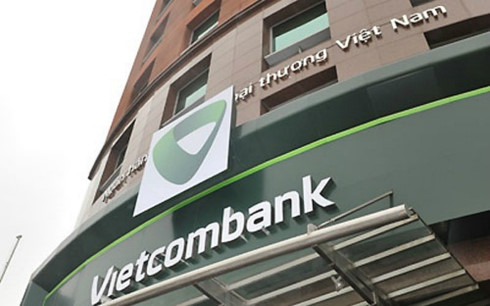 Vietcombank divested over $9 million from the share sale at the national airline Over the time period of January 25-February 8, the commercial bank was reported to conduct the stock transaction which subsequently downsized the bank’s proportion of shareholding at the national airline from the initial volume of 22.4 million shares to 14.8 million shares, commensurate with a reduction in the bank’s shareholding from 1.83 per cent to 1.21 per cent. As opined by the stock market’s analysts along the whole duration of the share deal, the commercial bank’s decision to divest such a hefty amount of stock at Vietnam Airlines was pondered as a “smart move” as the airline’s stock was regarded as an overweight on the domestic bourse with an unprecedented surging price of the ticker at VND70,000 ($3.07) per share. Briefly after the sale, the airline’s stock price plunged below VND50,000 ($2.2), a drop of roughly 30 per cent. The bottom of the dive was VND44,200 ($1.94) on February 10-12. After the abrupt divestment, Vietcombank’s stock price recovered mildly as it climbed back to VND52,800 ($2.31). Previously, Vietcombank bought the national airline’s shares at its initial public offering at VND22,300 ($0.97). Consequently, the bank gained a total profit of VND210 billion ($9.21 million) from the divestiture. Earlier, in late October 2017, Vietcombank was green-lighted to divest 19.8 million shares from Saigon Bank for Industry and Trade, Saigonbank, and Cement Finance Company (CFC). Later on, on November 20, 2017, the commercial bank withdrew 13.2 million shares (4.3 per cent) from Saigonbank at the base price of VND12,550 ($0.55) and 6.67 million shares (10.9 per cent stake) from CFC at VND11,549 ($0.51). From the latest two divestments from Saigonbank and CFC, Vietcombank secured a total of $15 million in proceeds, entering the top 48 most profitable banks in VIR |
↧
Article 1
|
A car with a desirable license plate number in District 1, |
In accordance with the attached rules, each license plate number can only be used on one vehicle and shall not be resold or transferred to another owner after the auction, Col. Duc said.
If an owner wants to transfer his vehicle to another person, who lives in the same locality, the license plate is allowed to be kept the same, he continued.
However, if the new owner resides in a different province or city, he will be required to register for a new number.
The initial price for a plate number is decided by authorities of each locality, based on the real demand and local economic development.
The auction will be carried out online via an official website, on which information regarding the plate numbers, initial price, and results will be publicized.
Bidders will be allowed to join the auction as long as they have an account, a vehicle, and its legitimate documents.
The bidding will be carried out entirely on a voluntary basis, Duc stated, adding that the money gained from the process will be directed to the state budget. By Duy Khang / Tuoi Tre News
↧
Article 0
French consultant proposes ADPi Engineering, a French company which specialises in airport architecture and engineering, has proposed an expansion plan for Tan Son Nhat International Airport at a meeting chaired by Minister of Transport Nguyen Van The. The meeting which was held on February 27 attracted representatives from the ministries of National Defence, Natural Resources and Environment and Planning and Investment.  ADPi Engineering's proposal for The said that the expansion of Tan Son Nhat Airport had drawn different opinions from ministries and agencies, so the ministry had selected ADPi Engineering as an independent consultant to develop an objective view on the issue. This is the final meeting about the airport’s expansion plan before the ministry submits the proposal to the government. The French consultant said it was necessary to develop infrastructure at the airport to meet the demand of serving around 301,000 flights with a total number of 51 million passengers and 960,000 tonnes of cargo by 2025. The figure would reach 315,000 flights with 55 million passengers and 1.2 million tonnes of cargo by 2030. Meanwhile, the current infrastructure can meet 36 million passengers per year. The firm recommended the necessity to restrict the airport’s maximum capacity at around 50 million passengers by 2025 to avoid the construction of the third runway which would be costly and cause environmental problems as well as noise pollution. The consultant also suggested using the golf course which is located in the north of the airport to build hangars, cargo terminal and maintenance and repair areas. Meanwhile, more passenger terminals should be built in the south of the airport to easily connect with the existing terminals. Dr. Duong Nhu Hung from HCM City University of Technology disagreed with the French consultant’s proposal, saying that the restriction of the airport capacity to 50 million passengers is inappropriate in the context of the increasing demand of passengers. Meanwhile, Cao Xuan Toi from Aviation Technology Association said that the French consultant’s suggestion was feasible, as by 2025, Minister of Transport Nguyen Van The said that it was impossible to raise The consultant also needs to analyse more clearly the impact of building terminals in the north or the south of the airport. The noted that the Ministry of Transport will inform the government of the TienPhong |
↧
Article 2
Social News 2/3 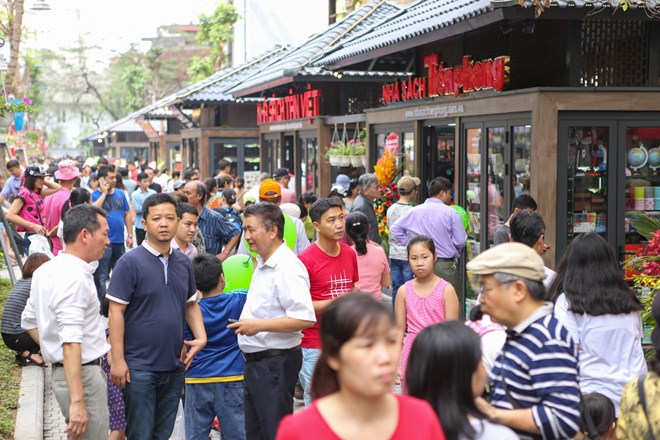 The spring book fair at According to the city’s Department of Information and Communication, Kim Dong Publishing House recorded the highest revenue of more than 400 million VND (17,720 USD), followed by Thai Ha and Nha Nam stock companies. The most attractive titles to readers featured the fourth industrial revolution, The street features 16 booths with easy access for children and people with disabilities, along with public computers for readers to search for information, free wifi and water. It is open to the public from 8:00 am to 10:00 pm every day. Agribank funds 1 billion VND for The Vietnam Bank for Agriculture and Rural Development (Agribank)’s branch in central Thua Thien-Hue province has agreed to provide funds worth 1 billion VND (44,000 USD) for the 10th Hue Festival. Under the deal, which was signed in Hue city on March 1, Agribank became the second biggest sponsor of the programme, after Carlsberg beer company - which earlier sealed a deal to fund 5 billion VND (219,500 USD) for the programme. Director of Agribank’s branch in Thua Thien-Hue Nguyen Van Binh said this is the 10th year in a row the bank has sponsored the festival – a special art, culture and tourism event in the central province. According to Vice Chairman of the provincial People’s Committee Nguyen Dung, this year’s festival has received sponsorship from nearly 20 units. Themed “Cultural heritage with integration and development, The biennial event looks to promote art and cultural exchanges as well as boost service-tourism growth. More than 20 international art troupes from various countries, including The old capital city of This year, the province hopes to welcome about 4.2 million visitors, up 10 percent year on year, and earn tourism revenue of 4.2 billion VND (184,380 USD), a rise of 15 percent. Bình Dương enjoys Lady Thiên Hậu Pagoda Fest The Bà Thiên Hậu (Lady Thiên Hậu) Pagoda Festival is being held from February 28 to March 2 in The festival is the southern province’s largest cultural festival. On March 2, the 15th of the first lunar month, the Bà (Lady) palanquin procession goes throughout the Pilgrims flock to the festival to pray for prosperity, good health and good luck for the whole year. The Bà Pagoda was built in ancient style in the middle of the 19th century. The Bà Đen (Black Lady) Mountain national tourism site in the southern On Tuesday it received its millionth visitor since February 16 (the first day of the Lunar New Year), two days earlier compared to last year, Phạm Văn Hải, deputy general director of the Tây Ninh Tourism and Trade Joint Stock Company, said. The Bà Đen Mountain Spring Festival opened on February 19, and featured a fireworks display and unicorn, lion and dragon dance performances. There are also special art performances, film screenings, sports events, and traditional games to entertain pilgrims and visitors. The annual festival runs until March 3. Chairman of the Hanoi People’s Committee Nguyen Duc Chung has asked for the Duong River Surface Water Treatment Plant project to be sped up. Chung visited the construction site of the key national project, which is expected to be operational by 2020, in Gia Lam district on March 1. The project is vital to the city’s sustainable water supply system, capable of providing a stable and long-term source of clean water for Hanoians, he said. He affirmed that the city will work with the Duong River Surface Water Plant JSC and help the firm complete the project on schedule. He also urged the company to ensure the project’s technical quality and effectively operate the plant once it is put into use to supply clean water for about 3 million people living in the east side of Hanoi. Chairman of the Duong River Surface Water Plant JSC Do Thi Kim Lien said many engineers and workers are working day and night at the construction site to finish the project’s first phase in October. Located on nearly 61.5 hectares, the plant will be developed in three phases to provide clean water for the city’s northeast districts (Long Bien, Gia Lam, Dong Anh, Soc Son and industrial parks along Road 179); south districts (Hoang Mai, Thanh Tri, Thuong Tin and Phu Xuyen) and neighbouring provinces like Bac Ninh, Hung Yen, and Hai Duong. The first phase, which will cost about 5 trillion VND (225 million USD) and have capacity of 300,000 cu.m per day. The plant’s capacity is expected to reach 600,000 cu.m per day by 2030 and 900,000 cu.m per day by 2050. Its clean-water piping system is the longest and most intricate in the country, running 76km with two river-crossing sections over the Hong (Red) and Duong rivers, and various sections running through railways, national and provincial roads. RoK’s dioxin detoxification method to be expanded in Thua Thien-Hue Deputy Minister of Natural Resources and Environment Vo Tuan Nhan has agreed to expand the Republic of Korea (RoK)’s microbiological method to detoxify soil contaminated with Agent Orange (AO)/dioxin in A Luoi district in the central province of Thua Thien-Hue. The method is being piloted at the district’s A Sho airport and helps reduce dioxin concentration in contaminated land by 35 percent, according to a report of the Vietnam Association for Conservation of Nature and Environment (VACNE). Speaking at a working session in Participants at the session lauded the capacity and efforts of Korean experts. They expressed their hope that the method will be carried out on a larger scale to boost the district’s socio-economic development. From 1961 to 1971, American troops sprayed more than 80 million litres of herbicides — 44 million litres of which were AO, containing nearly 370kg of dioxin — over southern The mountainous district was sprayed with 432,812 litres of grass-killing chemicals during the 10-year period. A Sho, a temporary airport during the war, was used for parking and washing of airplanes after spraying was completed, resulting in serious contamination of the area with dioxin. PM pushes for automated BOT toll tax nationwide Prime Minister Nguyễn Xuân Phúc has asked relevant offices to push for automated toll collection on build-operation-transfer (BOT) highways across the country. The Prime Minister believes that the automated model will help save time and ensure transparency. The Ministry of Transport, in collaboration with related ministries and agencies, was tasked with setting up standard rates for toll, which would be used as the foundation to bid for toll tax collectors as per the National Assembly Standing Committee’s resolution 437/NQ-UBTVQH, dated October 2017. Besides this, the transport ministry was asked to report to the Prime Minister on a roadmap for shifting to an automated toll collection model on all BOT highways by the first quarter of this year. The ministry was responsible to support BOT investors and toll tax collectors to apply the model. The authorities should review legal documents and circulars on implementing the automated model to ensure accuracy, transparency and synchronousity at all toll tax stations. Each vehicle has only one identity card which is used at all stations nationwide. The Prime Minister issued decision 07/2017/QĐ-TTg last year on implementing the model of collecting toll on BOT highways nationwide. Toll tax collectors were asked to install automated toll collection systems to ensure smooth operations 24x7 and to protect the personal information of clients as per legal regulations. After a year of implementation, the model has been proved to be effective, although it still has a few shortcomings. One of the reasons is the lack of legal documents regulating management and operation of the automated system. Since there is no roapmap for shifting to the new system, it is causing difficulties to toll tax collectors. Moreover, the launch of the model was not synchronous at all the stations, which caused inconvenience to road users. Ceremony honours 66 trained ethnic village birth attendants Trained ethnic village birth attendants (TEVAs) have played a remarkable role in reducing maternal and neo-natal mortality rates, especially in the mountainous and remote areas of Việt This was said at a ceremony held on Wednesday in Hà Nội to honour TEVAs. TEVAs are selected from ethnic minority communities and are trained for at least nine months in medical schools to provide services to pregnant women in remote and difficult areas. With an understanding of local cultures and indigenous customs, TEVAs can easily communicate with the ethnic communities and provide safe motherhood services. Y Ngọc, 38, is a Xê Đăng ethnic attendant in Kạch Lớn hamlet in Đăk Sao Commune. She hails from Tu Mơ Rông District in the Central Highlands’ “I send pregnant woman who are at medical risks or those who will soon go into labour to medical stations and sometimes even help them to give birth at home or on the way to a medical station,” said Ngọc. In 2017 alone, she conducted 132 pre-natal check-ups and sent two pregnant women with complications to hospitals for timely examination and treatment in Kạch Lớn hamlet. Thanks to Ngọc’s contribution, the rate of pre-natal check-ups increased from 50 per cent in 2009 to 93 per cent in 2017, while the rate of delivery in health clinics increased from 20 per cent in 2009 to 60.9 per cent in 2017. Ngọc is among 66 TEVAs, representing nearly 3,000 TEVAs across the country, to be honoured at the ceremony. Marked improvements in maternal healthcare “Việt “Training ethnic village birth attendants in mountainous and difficult areas is a temporary but effective measure to minimise geographical, cultural and financial gaps to help ethnic women get access to pre-natal check-ups, safe delivery options and post-delivery care services,” said Tiến. According to the health ministry, the country currently has 2,611 TEVAs working in 8,165 difficult villages and hamlets across the country. TEVAs visit families to provide healthcare consultations and encourage pregnant women to go to health clinics for regular prenatal check-ups as well as for giving births. Support of the European Union “We are delighted to see that Việt Nam managed to reduce the under-five mortality rate (per 1,000 live births) from 51 in 1990 to 24 in 2013 and the maternal mortality ratio (per 100,000 live births) from 140 in 1990 to 49 in 2013. This decreasing trend continued during 2013-2015,” said Stefano Manservisi, director general of the European Union’s Directorate for International Cooperation and Development. “The European Union’s support has been focused in the poorest of provinces, where mother and child health-related indicators are also low compared to that of the better-off regions. During 2015-2017, with our support, the percentage of deliveries attended by trained health staff has increased significantly, while the infant mortality rate has decreased in all 10 provinces,” said Manservisi. The EU has been the largest ODA (Official Development Assistance) donor and strategic partner of Việt Late PM Pham Van Dong’s birthday marked Late PM Pham Van Dong inspected a high-productivity paddy field in Hai Anh commune, Hai Chau district, Nam Ha province in 1969 An incense offering ceremony to commemorate the 112th birth anniversary of late Prime Minister Pham Van Dong, a prominent leader of Vietnam’s revolution in the 20th century, was held at his memorial site in Mo Duc district, the central province of Quang Ngai on March 1. At the event – hosted by the provincial Department of Culture, Sports and Tourism, participants recalled the life and career of the late PM, who was a Politburo member and an adviser to the Party Central Committee. Dong was also an excellent disciple and close comrade of late President Ho Chi Minh. Pham Van Dong, alias To, was born on March 1, 1906 in Duc Tan commune, Mo Duc district. He joined the revolutionary youth movement in In May 1940, he met Ho Chi Minh, who was known as Nguyen Ai Quoc then, in In early 1941, he and Vo Nguyen Giap were sent back to In August 1945, Pham Van Dong was elected to the National Liberation Committee at the Tan Trao National People’s Congress. After the August Revolution, he was appointed as the Finance Minister of the Government of the new Democratic Republic of Vietnam and elected a deputy of the first National Assembly. He led the Vietnamese delegation to the Fontainebleau Conference in France in 1946 and the Geneva Conference in 1954. In September 1954, Pham Van Dong was assigned to concurrently hold the positions of the Deputy PM, Foreign Minister and Chairman of the Party Central Committee’s Commission for External Relations. He was appointed as the PM by the National Assembly in September 1955 and continued to be entrusted with the post at the third National Party Congress five years later. He passed away in 2000. After the ceremony, participants visit an area exhibiting photos and objects related to the life and career of the late PM in the site. Hà Nội target fourth V.League title With a mixed team of young and experienced players, Hà Nội FC hope to win the V.League title this year. The tournament will kick off on March 10. Having participated in V.League for a decade, the representative of the capital city has always been a contender for the national premier league title. They won the trophy in 2010, 2013 and 2016 and finished second in 2011, 2012, 2014 and 2015. On Wednesday, the team announced its players, who hope to reclaim the title for the fourth time. Midfielder Nguyễn Văn Quyết will be the skipper of the team. The international player denied an attractive offer from Malaysian Kedah FC to stay with Hà Nội this season. He had earlier refused an offer from Muangthong United of Quyết, however, will not play in the first two matches of the season as he has been imposed a fine by the Việt Nam Football Federation. Quyết will command seven players who finished a great AFC U23 Championship in Some players from youth squads will be pushed to the first team to help them gain experience and prepare for tough matches in future. They include Hồng Sơn, who plays for the national U18 team and Minh Dĩ and Sỹ Huy of the national U20 team. They will be supported by veteran teammates, including former national player Phạm Thành Lương and foreign players Moses Oloya and Oseni. “Currently, we have seven national U23 players in the team. They played very well at the Asian Championship, but in the harsh environment of V.League, they will need to make more effort to contribute to the club,” said coach “Younger players will be used this season. They are ‘products’ trained by our own centre. They will show our trademark game at V.League. Days ahead of the tournament, we had a meet and set a target of winning the title this season. It is difficult when we can see the same quality in teams. But we are determined to take back the trophy that we lost last year,” Nghiêm said. The coach, too, is a highlight of the team as he is a stable moral and spiritual support for the players. Nghiêm is one of the club’s most experienced members as he has been with the team from its early days in 2005. In 13 years, Nghiêm has been an assistant to four head coaches, before being given the hot seat in 2016. In the same year, under his guidance, Hà Nội won the V.League title and finished second in the National Cup. Last year, Hà Nội came third in the last few minutes of the season, conceding the trophy to Quảng Nam FC. Apart from the title, Hà Nội also want to attract more supporters to Hàng Đẫy Stadium. The presence of U23 players in the team is expected to lure more fans to the stands. Earlier this year, Hà Nội initiated other activities, such as setting up their own professional supporters’ association, organising meets between fans and players, improving their facilities and, in future, building a new stadium. Hà Nội will play their first match against Hải Phòng on March 11 on their home ground. In 2017, Hà Nội drew Hải Phòng 1-1 in the first leg match and beat them 2-0 in the second. Lucky passenger wins Vietjet’s highest award Vietjet has awarded VNĐ100 million (nearly US$4,400) to Nguyễn Hồng Quang, a passenger on flight VJ378 flying from HCM City to Chu Lai in central Quảng Nam Province on February 13. The award, the highest offered by Vietjet, is part of the airline’s promotional campaign, “Enjoy Sky Festival”, which was held from December 28, 2017, to February 28, 2018. As part of the promotion, millions of passengers purchased promotional tickets, with prices starting from zero đồng, during the golden hour—from noon to 2pm — Vietjet said on Thursday. Passengers flying on the special flights also had a chance to participate in a lucky draw to win free domestic return tickets, “lucky money” prizes worth VNĐ10 million every day as well as gifts with a total value of up to VNĐ1 billion. Vietjet is a pioneering airline that offers many exciting promotional and entertainment programmes, especially during the festive season. Aiming to become a “consumer airline”, Vietjet is continually opening new routes, adding more aircraft, investing in modern technology and offering new add-on products and services to serve customers. Hà Nội boosts construction of water treatment plant The People’s Committee here has asked the management board, investors and contractors of The plant will supply clean water to three million residents in eight districts in the city, including Long Biên, Gia Lâm, Đông Anh, Sóc Sơn, Hoàng Mai, Thanh Trì, Thường Tín and Phú Xuyên. On a working visit to the plant on Thursday morning, chairman of the committee, Nguyễn Đức Chung, said the plant was among key civil infrastructure projects in Gia Lâm District as the current water supply had failed to meet the demand of the local residents. The committee aims to create the most favourable conditions for the management board to ensure the project’s progress and supply clean water to residents by 2020. Chung stressed that the installation of water pipelines was an important task, so the investor needed to have design and construction plans for the project’s second phase soon. The committee asked Gia Lâm District’s authority to persuade residents to shift for site clearance. Đỗ Thị Kim Liên, Chairman of Đuống River Surface Water JSC, expressed hope that the company would receive the support of the city’s committee and local authorities to complete the project. The project is nearing completion of its first phase, which was scheduled this October. The water treatment plant is located on nearly 62ha in Gia Lâm District’s Phù Đổng Commune. The plant will be developed in two phases, with a total investment capital of some VNĐ5 trillion (US$225 million). In the first phase, the plant will have the capacity to generate 150,000 cu.m of water per day by this October. In the second phase, to be complete by 2020, the plant will increase to 300,000cu.m of water per day. The plant’s capacity will increase to 600,000cu.m of water per day by 2030 and to 900,000cu.m of water per day by 2050. The plant’s piping system, which is the longest and most intricate in the country, runs for 76km, with two river-crossing sections over Hồng and Đuống rivers as well as various sections running through railways and national and provincial roads. Vegetarian food stores busy as the first full moon approaches People in The first full moon is on January 15th of Lunar Calendar, which falls on March 2 this year. People will go to pagodas and eat vegetarian food to purify the body and soul and bring peace to the mind. People in Thu Diu from Thu Duc District said, "I go to the markets to choose fresh food to put on the altar. I think that prices of vegetables are still the same, about VND15,000 to VND35,000 (USD1.54) per kilo. The prices of beans and mushrooms increased just a little bit by VND5,000." A kilo of dragon fruits cost VND40,000 (USD1.76) and VND60,000 for apples. A bunch of daisies costs of VND25,000 to VND40,000 and a branch of lily costs VND35,000. Thuy Ngan, a trader at Vuon Chuoi Market said more people went to the markets and the consumption of vegetables also increased sharply and would continue to rise tomorrow. The traders also prepared takeaway vegetarian food such, as vegetarian spring rolls and sausages, and attract many customers. Director of Thu Duc Market Management Company Nguyen Thanh Ha said up to 5,000 tonnes of agricultural products were transferred to the market every day. "The prices increase and drop depend on the supply of that product. The prices will be further adjusted when transportation fees to retail markets are taken into account," she said. The city Department of Industry and Trade has asked agencies to monitor prices. |
↧
↧
Article 1
Government News 2/3 President lauds external economic activities abroad 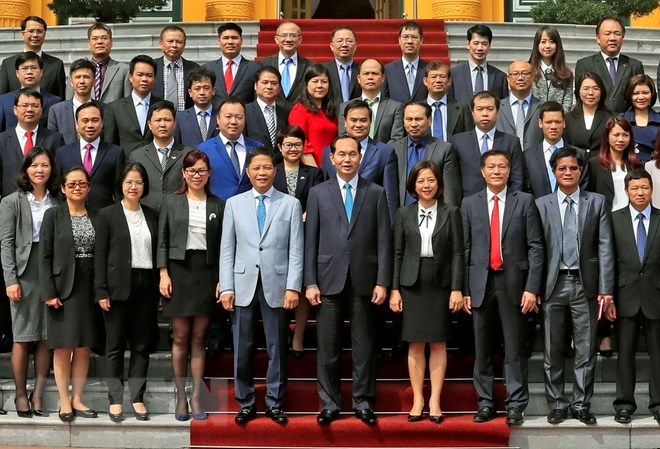 President Tran Dai Quang together with commercial counsellors and chiefs of Vietnamese commercial offices overseas President Tran Dai Quang lauded external economic activities and trade promotion abroad during a meeting in He said in compliance with the Party and State’s external policies, the Ministry of Industry and Trade has worked closely with ministries, agencies and localities to popularise Vietnamese goods, attract foreign investment and improve the competitiveness of Vietnamese firms at home and abroad. According to him, the Vietnamese commercial offices abroad have helped step up exports, especially typical farm produce and fruits, towards bringing Vietnamese goods to global distribution chains and marketing trademarks of Vietnamese goods abroad. They have partnered with domestic and foreign agencies to successfully hold trade and investment promotion conferences and seminars, as well as business forums during high-level visits by Party and State leaders. The leader hailed Vietnamese commercial offices abroad as an effective bridge connecting Vietnamese entrepreneurs overseas with domestic firms, and cooperate with domestic and foreign media to argue against information unbeneficial to The President noted that as 2018 is a core year to implement the Resolution adopted by the 12th National Party Congress and the National Assembly’s Resolution on the 2016-2020 socio-economic development plan, the industry and trade sector and Vietnamese commercial offices abroad in particular need to stay active, proactive and drastic to fulfill assigned tasks. He asked commercial counsellors and chiefs of Vietnamese commercial offices overseas to actively grasp situations in the host countries, improve market forecast to promptly give policy recommendations to They were also urged to push forward the ratification of signed new-generation free trade agreements and call on the Vietnamese business community abroad to look toward the homeland, thus contributing to national development. PM stresses major requirements for sectors 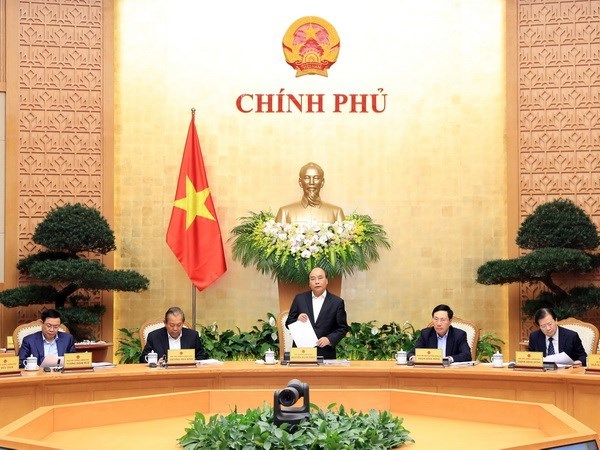 Prime Minister Nguyen Xuan Phuc is speaking Focusing on business production development and creating a healthier business environment remain major requirements for all departments and sectors, Prime Minister Nguyen Xuan Phuc said. He made the statement at the cabinet meeting in The Prime Minister said many countries in the world are adjusting their economic policies, including reducing corporate income tax, increasing imported goods tax and setting up trade barriers. Such factors would certainly impact Thus, he urged economic restructuring, increasing labour productivity, attracting more foreign investment, improving domestic production efficiency and better Government policies in socio-economic management in the context of the fourth industrial revolution. The PM called for bottlenecks in production of small-and medium-sized enterprises to be removed to drive growth in 2018. He expressed his delight at seeing business activities promptly resuming after the festival. Regarding the country’s development in February, the PM said despite the week-long Tet holiday, the macro economy, as well as interest and foreign exchange rates remained stable. February’s consumer price index (CPI) increased by 0.73 percent, with food and catering services up 1.53 percent. The index in the first two months of this year rose by 2.9 percent year-on-year. The leader also commented on exports in February, which stood at some 13.4 billion USD, raising the total export value in the two months to 33.6 billion USD, up nearly 23 percent year-on-year. The number of foreign visitors to He recognised achievements in various fields from foreign direct investment disbursement, business establishment, social welfare and rural development to defence-security. However, he warned about fluctuations in global prices and asked ministries and departments to maximise efforts to curb inflation and ensure macro-economic stability. Vietnam attends orchid diplomacy event in Czech Republic 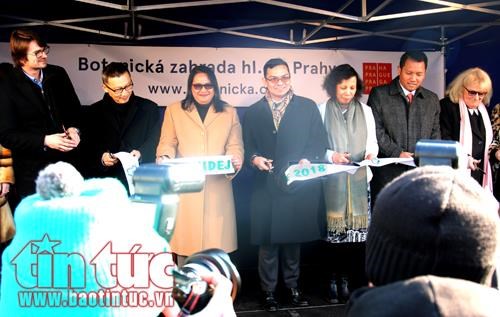 Diplomatic officials cut ribbon to open the Asian orchid exhibition 2018. The Vietnamese Embassy in the More than 100 kinds of Southeast Asian orchids, which were bred and taken care of by Czech botanists, were displayed at the Asian orchid exhibition 2018. The exhibition “Vietnamese forest” opened the journey through the Southeast Asian region with a mysterious imitative cave reminding of famous On the occasion, the Vietnamese Embassy introduced to international visitors and pressmen the country’s excellent cuisines as well as its beauty through the lens of Vietnamese photographers. Tran Huong, Counsellor at the Vietnamese Embassy in the The event also created opportunities for Prime Minister pledges favorable conditions for Japanese groups 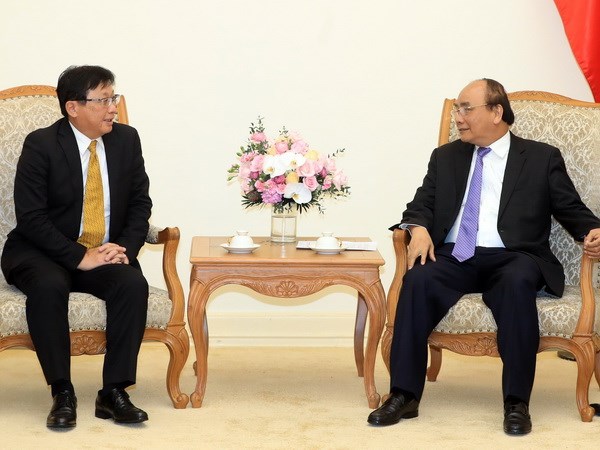 Prime Minister Nguyen Xuan Phuc (R) hosts Masayoshi Fujimoto, President and CEO of Sojitz Corporation of At a reception for Masayoshi Fujimoto, President and CEO of Sojitz Corporation of He also lauded Sojitz for pouring investments in infrastructure and industrial parks in He hoped the Japanese group will expand its operation in He said he expects that based on the extensive strategic partnership, more Japanese investors will come to “The success of Japanese investors will make important contributions to bolstering and deepening the efficient, productive relations between the two countries,” the PM said. Emphasizing the significance of and more opportunities from the participation in CPTPP of both Vietnam and Japan, he said he hopes businesses of the two countries will make the best use of this chance, bringing benefits for their country. Masayoshi Fujimoto spoke highly of In addition, Sojitz has been concentrating on completing power projects and conducting cooperative activities in training talents and high-quality human resources in |
↧
Article 0
BUSINESS IN BRIEF 2/3 GoBear GoBear, Asia’s first and only metasearch engine for insurance and financial products, has just appointed Bao Nguyen as its new country director in gobear vietnam announces new country director Bao Nguyen has over 24 years of international experience in financial services working in various countries, including the US, South Korea, Singapore, and Vietnam. He has served in senior leadership roles at Prudential, AIA, Citibank, Samsung, Standard Chartered, and BIDV Metlife before joining GoBear. Vietnamese by birth, Bao Nguyen was raised in Fluent in English and Vietnamese, Bao Nguyen is well known not only as a charismatic leader but also as an active community supporter and an enthusiastic tennis player. On this appointment, Andre Hesselink, CEO and co-founder of GoBear, said, “The knowledge, expertise, and experience that Bao Nguyen brings to GoBear further strengthens our footprint in Vietnam and reinforces our position at the forefront of financial comparison services providers. This appointment continues to consolidate the leadership of our company and is evidence of the great career opportunities that employment with GoBear may offer." "I am a huge believer in financial inclusion, and I see unprecedented opportunities for GoBear Since the official launch in Vietnam in early December 2016 with four products —comparison of credit cards, personal loans, travel insurance, and fixed deposits—as well as educational pages for unsecured loans, GoBear Vietnam has landed over a million visitors to www.gobear.com/vn to become a trusted provider of comparison services for financial products in Vietnam. Good start for BASF in 2018 “Last year, we achieved significant growth and were able to further increase our profitability. Moreover, we laid down the important groundwork for the future development of our company—both in terms of people and strategy,” said Dr Kurt Bock, chairman of the Board of Executive Directors of BASF SE, at the presentation of the 2017 Annual Report in In the fourth quarter of 2017, BASF Group posted sales of €16.1 billion ($19.7 billion), which represents a growth of 8 per cent compared with the same quarter of 2016. Prices rose by 9 per cent. BASF’s sales volume increased by 4 per cent, driven by all segments with the exception of oil and gas. By contrast, negative currency effects were significantly higher and reduced sales by 5 per cent. Income from operations (EBIT) before special items in the fourth quarter was €1.9 billion, up 58 per cent against the same period of the prior year. The significantly higher earnings in the chemicals, agricultural solutions and oil and gas segments as well as in others compensated for lower earnings in the functional materials and solutions and performance products segments. Economic activity picked up in many countries in 2017. “We took advantage of this upturn and markedly increased our full-year 2017 sales and earnings compared with the previous year,” said Bock. Thanks to good demand, BASF sold greater volumes in all divisions and considerably increased its profitability. Higher prices, especially in the chemicals segment, also contributed to this. Overall, BASF’s sales grew by 12 per cent to €64.5 billion ($78.9 billion). One contributing factor was Chemetall business acquired at the end of 2016, which offers tailor-made solutions for metal surface treatment. BASF’s earnings rose even more sharply, by around one-third. The company achieved EBIT before special items of €8.3 billion ($10.1 billion), with a significant contribution from the chemicals segment. Higher margins and volumes in basic chemicals and intermediate businesses more than offset the lower margins in some of BASF’s specialty businesses. Earnings in the chemicals business—which comprises the chemicals, performance products, and functional materials and solutions segments—were significantly higher than in the previous year. EBIT before special items in this business was €7.3 billion (8.9 billion), up 26 per cent versus the prior year. Earnings per share increased from €4.42 to €6.62 ($5.4-8.09), equivalent to a rise of 50 per cent. Adjusted for special items and the amortisation of intangible assets, earnings per share amounted to €6.44 ($7.87), compared with the €4.83 ($5.91) in the previous year. In the past year BASF made important decisions to add fast-growing, cyclically resilient businesses to its portfolio. In 2018, the agricultural solutions segment will be strengthened with the acquisition of significant parts of Bayer’s seed and herbicide businesses. “These will be an excellent complement to our well-established and successful crop protection business and our biotechnology activities. Also, we will enter the seed business with proprietary assets in key agricultural markets, which will also allow us to more quickly implement the results of our seed research,” Bock said. BASF wants to acquire Solvay’s global polyamide business this year. This will expand BASF’s range of engineering plastics for the transportation, construction, and consumer goods industries and will strengthen its access to raw materials. Furthermore, the company expects to improve access to important growth markets in Asia and “However, we also divest businesses when we believe they could be more successful in a different constellation,” said Bock. For example, BASF transferred its business with leather chemicals to Stahl Group, a leading producer of process chemicals for leather products, at the end of September 2017. In return, BASF now holds a 16 per cent share in Stahl Group. BASF has announced fundamental changes in its oil and gas activities. It is planned that BASF and LetterOne group will merge their respective oil and gas activities in a joint venture called Wintershall DEA. The new company would be one of the largest independent exploration and production companies in 12 billion-dong loss-making projects looking at brighter prospects 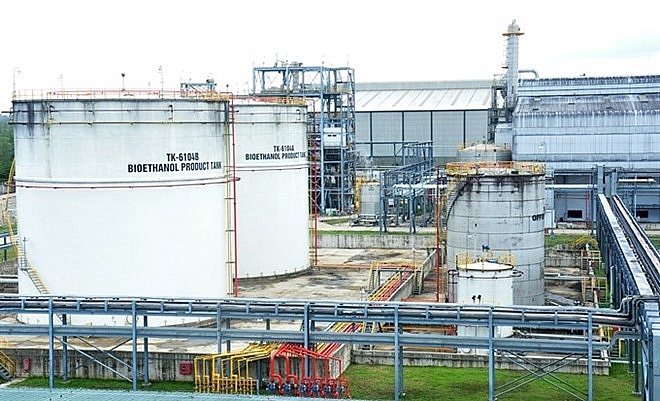 The Dung Quat Bio-Ethanol Plant of PetroVietnam Central Biofuels JSC Dinh Vu Polyester Plant (PVTex) resuming operations at its factory and PetroVietnam’s restarting of its group of biofuel factories are just two of many positive developments at the loss-making projects run by the Ministry of Industry and Trade (MoIT). Hoang Quoc Vuong, Deputy Minister of MoIT, has just announced that the biofuel factories of PetroVietnam have been restarting and will be able to sell products in March. Also in March, PVTex will re-open its factory after signing a sales contract. Within the second quarter of this year, PVTex will choose a foreign or domestic firm to collaborate and operate the whole factory. Nguyen Vu Truong Son, general director of PetroVietnam (the parent company of PVTex), said that after resuming operations at the polyester plant and agreeing on a method of co-operation, it will take 3-6 months to resume the operations of the whole of PVTex. Partners of PVTex want to solve technical barriers to importing polyester raw materials and ensure a stable power supply at DeepC Industrial Zone. Dung Quat Shipyard (DQS) is looking for an agency to settle and audit the EPC contract of its 104,000-tonne ship purchase. Additionally, DQS owns several high-value properties that are experiencing swift depreciation and is looking to dispose of those unnecessary for production. DAP-Vinachem (Vietnam National Chemical Group)’s Dinh Vu factory reported VND16 billion ($0.7 million) of profit in 2017 and VND66 billion ($2.9 million) in the first two months of this year. They have enhanced corporate governance and reduced costs by VND80 billion ($3.5 million) on-year in 2017. In addition to difficulties and challenges, nitrogenous fertiliser plants like Lao Cai, Ninh Binh, Ha Bac are maintaining their production and selling products at higher prices. Vietnam Steel Corporation (VNSteel), and Lao Cai Cast Iron and Steel Plant have completed the amendment of the joint venture contracts with the Chinese partner at the end of 2017. The Quy Sa mine project has produced and sold 2.58 million tonnes of ore and obtained over VND423 billion ($18.6 million) profit. If the products of Quy Sa are consumed domestically and exported as well, the mine is looking at brighter prospects. VNSteel plans to divest Thai Nguyen Iron and Steel Corporation (TISCO) and MoIT has given approval. Phuong Nam Pulp Mill factory under Vietnam Paper Corporation (Vinapaco) was auctioned off at the value of VND1.8 trillion ($79.3 million) last year and will auctioned off again at a 10-per-cent discount. If the project cannot be sold after three auctions, it should be re-valuated. At the meeting of the steering committee on handling the existing weaknesses of a number of inefficient projects and enterprises, Deputy Prime Minister Vuong Dinh Hue also stressed that the Politburo and the National Assembly confirmed not spending more money on these businesses and that they plan to treat them based on market principles. The DPM also noted that there are still difficulties, such as EPC contract disputes, project settlement issues, and working capital arrangements, that need to be overcome. N.A Motor to become strategic investor of Hapro Vietnam N.A Motor Co., Ltd. (N.A Motor), which spent VND1.25 trillion ($55.8 million) acquiring 97.7 per cent of Vietnam Motors Industry Corporation JSC (Vinamotor), will become the strategic investor of state-owned Hanoi Trade Corporation (Hapro). According to the approved equitisation plan, interested investors are permitted to buy a maximum of 65 per cent stake at a selling price not lower than the lowest winning bid at Hapro’s initial public offering (IPO). With the initial price of VND12,800 ($0.56) at the IPO, N.A Motor may spend at least VND1.83 trillion ($80.4 million) buying the offered stakes. Along with Vinamotor, N.A Motor also expressed interest in buying the assigned 36 per cent at Vietnam Engine and Agricultural Machinery Corporation (VEAM). At the time, in spite of being considered the largest initial public offering (IPO) in 2016, VEAM did not fare well on its launch, thus, N.A Motor only registered to buy the assigned 36 per cent at the price of VND10.050 ($0.45) per unit, much lower than the IPO price. However, specific information about the results of the deal has yet to be published. Established in 2005, N.A Motor specialises in distributing cars and motorbikes, selling spare parts, vehicle insurance, as well as providing vehicle maintenance and repair. The company is currently expanding its operations to the real estate sector. N.A Motor has a close relationship with BRG Group, the owner of Hilton Hanoi and BRG Kings Island Golf Resort in According to information published by the Hanoi Stock Exchange, Hapro, the owner of several golden land plots in the capital, will conduct its IPO on March 30. Accordingly, the corporation will put 75.93 million shares or 34.51 per cent of its charter capital on sale with the initial price of VND12,800 ($0.56) via an auction. Hapro expects to acquire at least VND971 billion ($42.78 million) from the IPO. VinaCapital spends $32.5 million on egg and poultry firm Ba Huan VinaCapital Vietnam Opportunity Fund (LSE: VOF), the flagship fund of VinaCapital, has injected $32.5 million in the Vietnamese producer of pasteurised eggs and poultry meat, Ba Huan JSC. Apart from acquiring a significant minority stake in the company, VOF said that it may also invest moderate additional capital during the next twelve months as the company delivers on mutually agreed milestones. According to Andy Ho, managing director of VOF, the private equity investment is consistent with VOF’s strategy of focusing on companies operating in fast-growing sectors. “Vietnamese food and beverage companies have tremendous growth opportunities ahead as consumers spend more on high-quality, healthy products. Ba Huan is well-positioned to capitalise on these trends, and we are excited to work with them to realise their potential,” said Ho. Holding more than 30 per cent of the pasteurised egg market, Ba Huan is a popular household name in The company has implemented a fully-integrated and enclosed value chain from feed production and farming to producing fresh, safe, and clean meat, eggs, and processed foods, enabling it to fully control product quality across the value chain and allowing it to fully trace its products. In 2018, the company expects its revenue to surpass $90 million. “Ba Huan has become one of the strongest fresh food brands in According to Poultry World, egg consumption is on the rise in By 2021, the average consumption of chicken is forecast to expand to nearly 17 kilogramme per year from around 8kg in 2015, driven by urbanisation and a growing middle class with greater disposable income. Additionally, poultry production continues to be dominated by small family farms, with limited resources to scale up. Ba Huan JSC was founded in 2001, growing from a family business to become the leading supplier of pasteurised poultry eggs in the Vietnamese market. The company operates two fully enclosed industrial poultry farms, including a layer farm with over 1.5 million chickens for commercial egg production and a broiler farm with over 400,000 chickens for meat production. Each day, Ba Huan supplies over 1.7 million eggs, delivers over 15,000 chickens, and processes over 25 tonnes of fresh poultry meat. These farms are qualified for local and international food safety standards and practices, such as Hazard Analysis Critical Control Point (HACCP) and VietGap. They are also well-organised to ensure proper distance between sub-farms and equipped with semi-automated systems for feeding, watering, ventilation, and heating. Ba Huan’s products are distributed through both the general and modern trade channels, such as major grocery chains and major international fast food businesses via a comprehensive distribution network of more than 2,000 agents and points of sale throughout US opens doors wider for Vietnamese farm produce The US has opened the doors for more Vietnamese agricultural exports with the establishment of an inspection office right in the country. The US Embassy in With this office, which is considered an important step toward boosting US-Vietnamese agricultural co-operation, Vietnamese exporters and authorised In the past, in order to export fruit to the “The APHIS After analysing the potential plant pest risks, APHIS scientists will determine under whether imported products, including those from Two months ago, the first Vietnamese star-apples began to be exported to the Recently, APHIS also allowed for the importation of mango from With this, According to an expert from the Department of Crop Production under the Vietnamese Ministry of Agriculture and Rural Development, a rise in fruit exports to the “It will make it much easier for APHIS is a multifaceted agency with a broad mission area that includes protecting and promoting T&T gunning for strategic ownership in Vinafood 2 T&T Group expressed interest in buying the 125 million shares (representing 25 per cent of the charter capital) on offer to become the strategic investor of Southern Food Corporation (Vinafood 2). According to information published by Vinafood 2, despite the fact that T&T only meets two thirds of the criteria issued by Vinafood 2 to select the strategic investor, the Ministry of Agriculture and Urban Development has still submitted the application to the prime minister as T&T is the sole applicant. According to the approved equitisation plan, interested investors are permitted to buy a maximum of 125 million shares or 25 per cent stake at a selling price not lower than the lowest winning bid at Vinafood 2’s initial public offering (IPO). With the initial price of VND10,100 at the IPO, T&T may spend at least VND1.26 trillion ($55.47 million) buying the 125 million shares. Along with the share volume offered for the strategic investor, the company will put 114.83 million shares, equalling 22.97 per cent of the charter capital, on sale via a public auction with the starting price of VND10,000. Besides, it offered 4.969 million shares for employees and 200,000 shares for the corporation’s trade union. After the equitisation, the state will retain 255 million shares or 51 per cent of the charter capital. Previously, Vinafood 2 has issued the criteria to select the strategic investor. Notably, interested firms must be in operation for at least five years, with at least three years of experience in dealing with agricultural products as well as food manufacturing and processing. Furthermore, investors must have a charter capital of at least VND2.5 trillion ($110.06 million) and must have been free of accumulated loss at the end of 2016. Besides, investors must commit to restructuring Vinafood 2 to improve the manufacturing and processing of agricultural products and foodstuff. Investors will also commit to keeping the acquired shares for at least five years. As per Vinafood 2’s 2016 financial report, the company achieved net sales of VND9.95 trillion ($438 million), a year-on-year decrease of 36 per cent, and after-tax profit of VND157 billion ($7.7 million), up 15 per cent over the previous year. At the end of 2016, Vinafood 2’s accumulated losses stood at VND798 billion ($35.1 million). As of December 31, the actual value of the parent company was VND14.61 trillion ($643.2 million), of which the actual value of state capital was VND5.38 trillion ($236.8 million). T&T group operates in numerous sectors, including property, finance, industry, investing in sports and import-export trading. Besides, on February 6, 2018, T&T Group and Boskalis Group from Ninh Van Bay Travel’s losses keep mounting Ninh Van Bay Travel Real Estate JSC’s accumulated losses increased to VND480 billion ($21.1 million) due to the ineffective liquidation and transfer of two investment projects in 2017. Ninh Van Bay Travel Real Estate has just released the fourth quarter financial results which showed considerable fluctuations compared with the same period last year. Specifically, net revenue from the sales of goods and the provision of services hit VND45 billion ($1.9 million), up 17 per cent against 2016. However, financial revenue has been reduced from VND11 billion ($485 thousand) to around VND500 million ($22 thousand) due to decreasing interest income from deposits and loans. Meanwhile, financial costs have increased by 21 times to VN230 billion ($10.1 million) as the company suffered losses when transferring all of its contribution capital, loan, and interest receivables at Hai Dung Co., Ltd. However, its after-tax loss was reduced to VND177 billion ($7.8 million) as the company gets debt exemption of VND72 billion ($3.1 million). In the second quarter of 2017, the company made provisions for receivables from Tan Phu Travel JSC, which added another VND246 billion ($10.8 million) to enterprise management costs. In addition, its liquidation of two investments has created large profit fluctuations. When the company earned VND15 billion ($661 thousand) in profit in 2016, its after-tax loss amounted to VND456 billion ($20.1 million) in 2017, which is far below the year’s target of VND16.5 billion ($727,000). The company had negative undistributed earnings of VND690 billion ($30.4 million) at the end of 2017. Beside provisions for short-term receivables, the company did not cover the construction costs of an unfinished resort in Nhon Trach district of Dong Nai province after transferring the subsidiary. As a result, Ninh Van Bay’s asset value reduced by roughly VND784 billion ($34.5 million) to VND534 billion ($23.5 million) in 2017. Meanwhile, its debt declined by VND300 billion ($13.2 million) to VND144 billion ($6.3 million) thanks to the settlement of bonds issued three years ago. The company aims to restructure investment and focus on high-yield assets by making evaluations and provisions at subsidiaries. In the coming time, the company will transfer stakes at Emeralda Ninh Binh to solve its capital problems. Ninh Van Bay Travel Real Estate JSC specialises in developing and managing high-quality travel real estate resorts in In the medium and long term, the company shall develop a chain of luxury and upscale resorts in other tourism cities. However, the company recorded continuous losses and lack of capital for numerous projects during the property crisis. Ministry of Finance also refuses to help Mai Linh After being refused by the Vietnam Social Security, Mai Linh’s proposal to receive exemption from interest and late payment fees as well as to extend the deadline for its original social insurance payment was also refused by the Ministry of Finance (MoF). In early February, MoF issued an answer to the negative to Mai Linh’s proposal. Accordingly, MoF said such requests are not within the company’s legal rights. Besides, MoF also stated that there has yet to be any precedent or regulation related to the case. Furthermore, MoF proposed to refer Mai Linh’s request to the Ministry of Labour, Invalids and Social Affairs (MoLISA) and the Ministry of Health (MoH) because, according to regulations, MoLISA is in charge of social insurance and voluntary insurance issues, while MoH is in charge of health insurance-related queries. Previously, Tran Dinh Lieu, deputy general director of VSS, told Vneconomy that the Vietnam Social Security (VSS) cannot meet Mai Linh’s requirements because the proposal is not legal. VSS promised to forward the company’s request to the government and relevant agencies for consideration. Meanwhile, numerous experts claimed that it would be difficult to approve the request, saying that every year In January 2018, Mai Linh sent a document to the National Assembly Committee for Social Affairs, MoF, and VSS to report its massive accumulated outstanding debts of social insurance, health insurance, and unemployment insurance, as well as plunging revenue. According to the company, the bleak financial results were caused by the unfair competition from Uber and Grab. Thus, Mai Linh requested the National Assembly Committee for Social Affairs, MoF, and VSS to cancel the interest and the penalty on its social insurance debts and late payment fees, while simultaneously extending the deadline for its original debt payment and permit Mai Linh to pay within 20 months of 2018, with VND6 billion ($264,251) per year. Ninh Binh nitronegous fertiliser plant resumes operations in massive debt Despite resuming operations, Ninh Binh Nitronegous Fertiliser Plant faces difficulties in remaining open in the long run due to lack of capital and massive debts. According to information from Vu Van Nhan, general director of Ninh Binh Nitrogenous Fertiliser One-Member Co., Ltd., after surmounting technical problems, the plant has resumed operations on January 22, 2018 at 80 per cent of its designed capacity. Within one week (January 22-29), the plant manufactured 27,000 tonnes of urea fertiliser, 22,000 tonnes of which was bought. Nhan stated that at present, the plant is in stable operation, however, it is difficult for Ninh Binh nitrogenous fertiliser company to maintain operations on the long run because the firm lacks floating capital and suffers from massive debts. Notably, in 2017, the firm reported VND1.172 trillion ($51.5 million) in revenue, however, it still suffered a massive loss of VND933.5 billion ($41.03 million). Furthermore, as of August 2017, the company shouldered debts of VND4.502 trillion ($198.69 million) from various banks. VND3.263 trillion ($143.4 million) of this is long-term loans from VietinBank, VND1.184 ($52.04 million) from BIDV and Vietcombank, and VND55 billion in interest payments to BIDV and VietinBank. Besides, the company had to borrow from Vietnam National Coal-Mineral Industries Holding Corporation Limited (Vinacomin) VND133 billion ($5.85 million) worth of materials to maintain its operations until the end of this March. In the next short-term period, the company needs an additional VND80 billion ($3.5 million) to buy 40,000 tonnes of coal for production. At the working session with Deputy Minister of Industry and Trade Do Thang Hai, the company’s Board of Directors requested support from the government, the Ministry of Industry and Trade, as well as banks. Notably, the Board of Directors proposed MoT to guarantee a loan of VND350 billion ($15.38 million) of floating capital from banks for the company’s manufacturing and trading activities. Besides, the company proposed a three-year loan of VND200 billion ($8.79 million) to overhaul the plant this year. Hai stated that MoIT will co-operate with Vinacomin to support Ninh Binh Nitrogenous Fertiliser plant to deal with its financial and technological problems. The ministry will organise a working session with Vietnam National Chemical Group (Vinachem)—the investor of the plant—and Vinacomin to discuss Vinacomin providing 40,000 tonnes of coal in advance to ensure the plant remains in operation. However, in reality, the company will have to make some radical changes to remain on the surface at an oversupplied urea fertiliser market. Besides, with the plant’s bleak business results, banks will not be forthcoming with further loans. Petrolimex and Indian Oil officially enter race for Binh Son Refinery Petrolimex and Indian Oil have officially submitted the application to become strategic investors of Binh Son Refining and Petrochemical Co., Ltd. (BSR), according to newswire NDH. After conducting a successful IPO, BSR is selling 49 per cent to a strategic investor as part of the strategy to decrease state ownership to 43 per cent. According to a representative of the BSR board of directors, only Petrolimex and India Oil submitted applications, while the other interested investors, including Pertamina from Previously, at the roadshow to introduce investment opportunities in BSR organised on January 5 in According to the equitisation plan, BSR will list 241.4 million shares on the Unlisted Public Company Market (UpCOM). The first transaction day will be on March 1 with the reference price of VND22,400 ($0.98), according to information published by the Hanoi Stock Exchange. Previously, on January 17, BSR reported a successful initial public offering (IPO) with a complete take-up of the offered shares and the record selling price of VND14.8 million ($651.69) apiece. The average selling price was VND23,043 ($1.01), 57.8 per cent higher than the initial price. The lowest selling price was VND20,800 ($0.92). Of particular note, an individual investor succeeded in buying 10,000 shares at the record price of VND14.8 million ($651.69) apiece. BSR earned VND5.57 trillion ($245.26 million) in proceeds, 1.5 times higher than its expectations. Viglacera pours $22 million into Phu Ha Industrial Park Pouring nearly VND500 billion ($22 million) into building social housing (the first phase) and a wastewater treatment plant with a capacity of 1,250 cubic metres per day will attract more investors to Phu Ha Industrial Park. The construction of the VND480 billion ($21.1 million) social housing project at Phu Ha Industrial Park has just been kicked off to improve the quality of the IP and attract more investors. Tran Anh Tuan, director of the Viglacera Project Management Unit, said that the social housing project covers an area of 4.3-hectare in Ha Loc commune of Phu Tho town. The project is expected to provide 630 apartments, ranging from 26 to 70 square metres for 2,500 workers. The project aims to improve the living standard of the employees, ensuring their commitment to the firm, as well as attracting more investment to the IP. Viglacera committed to focusing its resources on the construction work so that the apartments can be rented as scheduled, Tuan said. “The rent is estimated at VND30,000 per sq.m, which is in conformity with the income of the workers,” revealed Tuan. Earlier, Viglacera has launched the construction of housing projects for workers in Yen Phong Industrial Zone (IZ) of Bac Ninh province and Dong Van 4 IZ in Ha The construction of Phu Ha IP was kicked off in February 2015. It has attracted $90 million from 13 firms mainly specialising in electronics and electricity production using advanced technology. These firms have created 10,000 jobs. Hoang Cong Thuy, Deputy Chairman of the Phu Tho People’s Committee, said if the entire land area in the IP was to be rented out for production activities, there would probably be 30,000 workers. Therefore, Viglacera’s project is needed to meet the demand of current and future workers. “The province will create many favourable conditions to support Viglacera in dealing with administrative procedures and management later on,” confirmed Thuy. On the same day, the corporation inaugurated a VND16 billion ($0.7-million) wastewater treatment plant in the IP, with a capacity of 1,250cu.m per day. The contractor of this work is Ecoba Environmental Technology Co., Ltd., a company with considerable experience in the field of wastewater treatment. The second phase of the plant will be launched when the number of firms in Phu Ha IP increases. Creador to invest additional $100 million in Vietnamese M&A deals After spending more than $40 million on buying into Mobile World Investment JSC (HoSE: MWG), Kuala Lumpur-based investment fund Creador will continue to invest an additional $100 million in M&A deals in Vietnam in the next three years. This was announced by Brahmal Vasudevan, CEO of Creador, at a recent interview with Dealstreetasia. Brahmal Vasudevan said that the fund is impressed with the speed of economic growth in At present, the fund is collecting capital for the $500-million investment fund named Creador IV. The collection is expected to be completed in June this year and Creador will spend 20 per cent of this capital ($100 million) on investing in M&A deals in Previously, in January, Creador completed the purchase of five million shares, or a 35 per cent stake, in MWG for $43 million from Mekong Enterprise Fund II. “With a thriving young population and rising disposable incomes, we foresee robust growth in the Vietnamese consumer sector. MWG stands out among its peers, not only because of its dominance in offline retailing, but also its market-leading position in online retailing with 16 per cent market share currently,” Creador said in a note to investors. Established in 2011, Creador is a private equity firm focused on partnering with passionate entrepreneurs to grow world-class businesses in South and The private equity firm closed its previous vehicle at $415 million in late 2016. It specialises in investing in finance, retail, F&B, pharmaceuticals, media, and business supporting services. The core geographies are PTSC to make $57 million investment aboard PetroVietnam Technical Services Corporation (PTSC), a subsidiary of PetroVietnam, will contribute $57 million to the establishment of a joint venture company with Yinson Clover Ltd. (YCL) in the Establishing the joint venture company is a clause in a contract signed between YCL and Talisman The joint venture is named PTSC Ca Rong Do Ltd. and carries a total investment capital of $111.62 million, 51 per cent from PVS and the remaining 49 per cent from YCL. Under the proposed joint venture, the two companies will jointly undertake the execution and performance of the bareboat scope of work, including the bareboat charter of the floating production storage and offloading (FPSO) under the time charter contract. Previously, in May 2017, YCL was awarded a contract from TLV for the supply, operation, and maintenance of a floating production storage and offloading (FPSO) facility for the Ca Rong Do (CRD) field development—block 07/03 offshore The contract is for a fixed period of 10 years, with five yearly extension options exercisable by TLV. The estimated total aggregate value of the bareboat charter is approximately $1 billion for the entire 15-year charter, inclusive of all five yearly extension options. As required under the contract bid, YCL entered into an agreement with TLV and PTSC for the novation of all rights and liabilities under the contract to PTSC. PTSC and YCL will subsequently form a joint venture company which will enter into a bareboat charter contract with PTSC for the bareboat scope of work under the contract. A member of PetroVietnam, PTSC was established in February 1993 through the merger of two units, Petroleum Service Company (PSC) and Geophysics and Petroleum Service Company (GPTS). PTSC’s main field of operation is supplying technical services to the oil and gas and industrial sector, including engineering procurement construction and installation (EPCI) for offshore facilities; implementing engineering-procurement-construction (EPC) for industrial facilities; FSO/FPSO services; offshore support vessels; seismic survey services; as well as geophysical and geotechnical survey services, among others. Dragon Capital spends over $37 million to double PNJ holdings A group of funds run by Dragon Capital bought an additional 5.22 million PNJ shares to raise ownership to approximately 11.4 million shares, equivalent to 10.49 per cent. The Ho Chi Minh City Stock Exchange (HSX) has just announced the changes of foreign ownership at Phu Nhuan Jewelry JSC (HoSE: PNJ). Particularly, a group of funds run by Dragon Capital, including Vietnam Enterprise Investments Ltd. (VEIL), Wareham Group Limited, Norges Bank, KB Vietnam Focus Balanced Fund, and Hanoi Investments Holdings Limited, has just spent over VND841 billion ($37 million) to buy 5.22 million PNJ shares. According to HSX, PNJ’s revenue hit VND3.221 trillion ($141.6 million) in the fourth quarter of 2017. Accumulated revenue in 2017 hit VND10.976 trillion ($0.5 billion), up 28 per cent on-year, equivalent to 115 per cent of the yearly plan. Up to the end of 2017, PNJ’s total amount hit VND335 billion ($14.7 million), rising VND180 billion ($8 million) compared to the beginning of the year. The value of inventory increased by VND564 billion ($24.8 million) to VND3.4 trillion ($150 million). The total value of property gained over VND900 billion ($40 million) to nearly VND4.5 trillion ($197.5 million). Besides, PNJ has set aside VND395.3 billion ($17.4 million) for a long-term investment into 38.5 million shares of DongA Bank. Sunseap International enters solar co-operation with InfraCo Asia On February 14, Sunseap International, the international arm of Singapore’s leading clean energy provider Sunseap Group, signed an agreement with InfraCo Asia Development Pte., Ltd. (InfraCo Asia) to jointly develop a 168MW utility-scale solar power project in the south central coastal province of Ninh Thuan. Accordingly, InfraCo Asia will take a minority stake alongside Sunseap’s existing partner, CMX RE InfraCo Asia will bring its leadership expertise and provide funding for the development phase of the project. The project is expected to reach commercial operation by June 2019. During the construction phase, the solar power project will be able to create jobs for more than 200 local workers. Approximately 30 long-term jobs will be sustained when the project is in operation. Lawrence Wu, co-founder and director of Sunseap, said, “We are delighted to have received the support of InfraCo Asia for our first project in “Sunseap International remains focused on developing innovative solar energy solutions that benefit communities in the region while saving the environment. We hope that our solar power project will help to promote green energy investment in “As the opportunity for renewables in The initial investor of the project was CMX Renewable Energy Vietnam Co., Ltd., a joint venture of Sunseap International and CMX RE In October 2017, the Ninh Thuan People’s Committee approved the investment planning of the investor. Being one of the first large-scale solar projects to go online in Electricity demand in In April 2017, Sunseap is one of the largest and most established players in the solar energy industry in the region. It has a pipeline of projects in InfraCo Asia is an infrastructure development and investment company which aims to stimulate greater private sector investment in infrastructure in the low-income developing countries of South and It funds pre-financial close, early stage, and high-risk infrastructure development activities by taking equity stakes in socially responsible and commercially viable infrastructure projects that contribute to economic growth, social development, and poverty reduction. |
↧
Article 0
Vietnamese businesses open the door to foreign investors More and more Vietnamese manufacturers are calling for foreign investment to implement their business expansion plans.  Vietnamese manufacturers are calling for foreign capital Some analysts recently voiced their concern about the trend of selling Vietnamese businesses to foreigners, warning that it would result in the disappearance of Vietnamese brands. Meanwhile, Pham Viet Muon, former deputy head of the Steering Committee on Enterprise Renovation and Development, said it would be better to think about the gains when selling shares to foreign investors, rather than worry about Vietnamese brands. Muon pointed out that many Vietnamese businesses, including Vinamilk and Binh Minh Plastics, are growing well after equitization and selling of shares to foreigners. Kelvin Tan, CEO of HSBC Thailand, told VIetnam Investment Review that M&As should be considered “long-term partnerships” rather than “hostile takeovers”. Even family-run businesses, which seem to dislike the presence of outside shareholders, have changed their mind. At the ceremony announcing strategic cooperation with DEG, a fund of KfW and VOF of VinaCapital, Le Duc Nghia, CEO of An Cuong JSC, a wooden furniture manufacturer, said M&As are common in the world. He said if Vietnamese businesses fear hostile takeovers or loss of control, they will not be able to enter large markets. With its one more strategic partner, Sumitomo Forestry from Japan, An Cuong plans to expand its business overseas, including the US and Japan. Meanwhile, another Japanese corporation, Sekisui Chemical, a subsidiary of Sekisui Group, has become one of the strategic shareholders of Tien Phong Nam Plastics, holding a 25 percent stake.
Sekisui and Tien Phong will cooperate to produce and sell Sekisui’s products, which target Japanese ODA-funded construction works and other projects in Vietnam and Asia. According to Dang Quoc Dung, CEO of Tien Phong Nam Plastics, the company decided to cooperate with Sekisui after realizing that the products cannot be made in Vietnam. Tien Phong Nam plans to export 20 percent of its total output after it completes construction of a factory in Binh Duong province. Japan, with plastics import value of $10 billion a year, is hoped to be a potential market for Vietnamese plastics manufacturers. According to the Vietnam Plastics Association, Japan is the biggest consumer of Vietnam’s plastics exports with plastics import turnover accounting for 25 percent of total export turnover to Japan. Analysts say that Vietnam is still one of the most attractive destination points for foreign investors. They are not only interested in real estate projects, but also want to pour money into industries which can exploit advantages from FTAs (free trade agreements). Meanwhile, investments can bring benefits to Vietnamese businesses which need capital and experience from international groups. Mai Thanh, VNN |
↧
Article 2
Korean Minister of Land to visit Vietnam, Singapore Korean Minister of Land, Infrastructure and Transport Kim Hyun-mi will visit Vietnam and Singapore next week to support local companies' bids for infrastructure projects and expand economic ties with the Southeast Asian nations, according to the Yonhap News Agency. 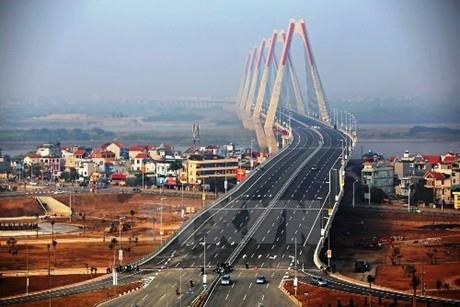 During the four-day trip starting on March 5, Kim will meet senior officials and businesspeople in transport and construction industries. In Later, she will head to Korean investors show more interest in Southeast Asian countries as a way to diversify their export markets in the face of growing protectionism from major trade partners, including the US and China. According to the Korea International Trade Association (KITA), the VNA |
↧
↧
Article 1
Parkson Bad luck still clings to Parkson as the Malaysian group continues to report losses and unsatisfactory business results in 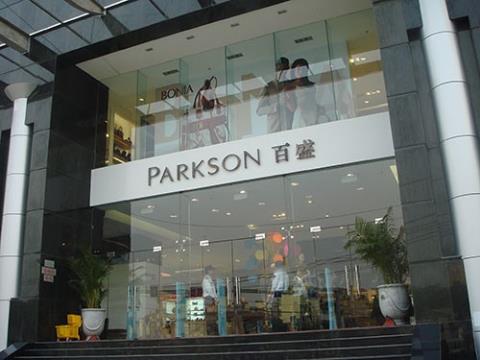 Parkson in Parkson has announced the shutting down of Parkson Flemington in Parkson Holding Berhard reported total revenue of 4 billion RM, or VND23 trillion in 2017 and loss of 142 million RM, an increase of 40 percent over the year before. The SSSG (same store sales growth) rate of Parkson The total revenue from both
In the letter to shareholders, Tan Sri William H.J. Cheng, chair of Parkson Holdings, said the Vietnamese retail market is still in a saturation period which has caused difficulties for Parkson’s operations. Parkson joined the Vietnamese market in 2005 and became one of the first retailers of branded goods in the country. However, Parkson’s investments in After closing the last shopping center Meanwhile, the southern market was still good and shopping centers in However, with the announcement of the closure of Parkson Flemington in Leaving the Vu Vinh Phu, a trade expert, said in Dat Viet that demand for the products Parkson is trading show no signs of increase. In Mai Thanh,VNN |
↧
Article 0
Room rental rates in Room rental rates in
It currently costs a renter VND700,000 to one million per month for a 20 to 25 metre-square-room, up 30 per cent year-on-year, according to Sai Gon Giai Phong (Liberated Sai Gon) newspaper. Due to the rising number of university students and labourers coming back to Couple Duc and “I collect and trade used things for a living while my husband repairs electric devices. We earn VND8 to 10 million per month and are looking for a room that is maximum VND2 million. That room should not be too small for our children.” They have planned to move to Binh Chanh District for cheaper alternatives. Four university students from the Le Trung Thinh, a member of the group, complained that their previous landlord had promised to keep unchanged the rental rate after Tet. However, the landlord recently decided to raise it to VND700,00 per room, with effect from February. “We, of course, had to leave and have not yet been able to find affordable rooms in the area,” he said, adding that searching for rooms takes a large amount of their time, which affects their studying. Many students in Go Vap, Thu Duc, and Binh Thanh District have to cramp into one small room or move further away from their school to save money. Landlord Linh on Binh Hung Commune’s In order to support university students and labourers, People’s Committees of District 8, 9, 12, among others have organised multiple activities. In Thu Duc District, the Labour Union, together with relevant authorities have sent officials to households that offer rental service to encourage them to maintain the rate. Meanwhile, at the ward-level office of many district People’s Committees, information on where to find rooms and landlords’ mobile numbers have been posted for people in need. According to the Youth Worker Support Centre, it collected information on available rooms for rent before Tet, ready to share to renters after the holiday. However, the system was jammed up a little due to surging demand. The centre is gathering and categorising information on room status, which will be later announced to labour and youth unions in the city. Nguyen The Trinh, director of a rental agency in District 8, said that renters should ask their landlords in advance of any changes in the rate and renew their rental contracts before Tet to refrain from paying higher prices in the new year. VNS |
↧
Article 2
Government News 6/3 NA Vice Chairman pays working visit to Yen Bai 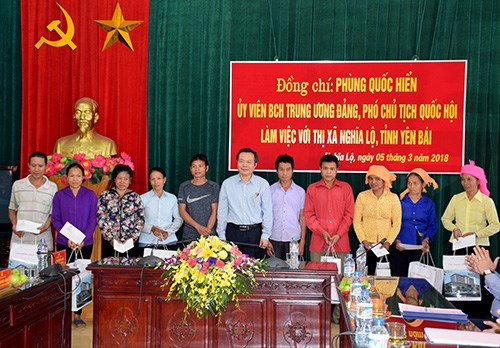 Vice Chairman of the National Assembly Phung Quoc Hien presents gifts to local poor families affected by flooding in 2017. (Source: yenbai.gov.vn) Vice Chairman of the National Assembly Phung Quoc Hien has asked Nghia Lo town in the northern mountainous During his visit to the town on March 5, Hien praised Nghia Lo’s growth in trade and services, as well as its building of a smart town and maintenance of outstanding economic models. As a cradle of ancient Thai people’s culture, Nghia Lo should step up the promotion of its culture and people, he said, asking the locality to promote agricultural production towards high quality and pay attention to industry-craft industry. While building the town, Nghia Lo needs to roll out both a master plan and specific planning schemes of residents, embankments and roads, the legislator noted. He used the occasion to laud Nghia Lo’s performance in poverty reduction and settlement of natural disaster consequences. At the working session, Nghia Lo leaders proposed the legislature soon ratify the plan on administrative expansion for Nghia Lo in order to turn the town into a centre of culture, services and tourism of Yen Bai’s western region and a third-tier urban area. The local leaders also called for the NA’s support for the building of resettlement areas for families in natural disaster-prone areas, and the construction of bridges, embankments and roads destroyed by downpours and floods. Nghia Lo also proposed the NA and the Government invest in the section connecting National Highway 32 in Nghia Lo with the On this occasion, Hien presented 20 gifts to local poor families affected by flooding in 2017 in Ban Cong commune, Tram Tau district, and Nghia Lo town. The same day, Hien and his encourage made fact-finding trips to road sections from Mau A town in Van Yen district to Nghia Lo and from Yen Bai’s Tram Tau districtto Bac Lien district of Son La province. Yen Bai was among localities that had suffered great losses from flood and landslides in October 2017. The disasters killed six people, left 16 others missing and injured seven others. In addition to that, the disasters also ruined 1,251 houses, 73 of which collapsed or were swept away completely, badly affected road traffic, and broke six kilometres of embankments. Deputy PM hosts Sumitomo Mitsui Bank’s senior official 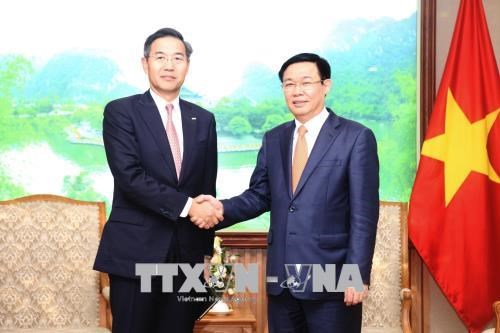 Deputy Prime Minister Vuong Dinh Hue (right) shakes hands with Shosuke Mori, head of the Sumitomo Mitsui Banking Corporation (SMBC)’s Asia Pacific Division. Deputy Prime Minister Vuong Dinh Hue received in The SMBC, one of the largest and oldest banks in As the Government of Vietnam has been restructuring the local banking system, the SMBC wants to take part in that process by sustainably developing Eximbank and supporting other local banks’ reforms in the coming time, he said. As a global bank, the SMBC expects its clients worldwide will invest in Deputy PM Hue welcomed the presence of SMBC in He noted that a new scheme for restructuring credit institutions was adopted to improve capacity of commercial banks and accelerate the resolution of non-performing loans. Though the restructuring process has harvested some positive outcomes but many challenges are waiting ahead, The government is committed to continue improving local business climate and providing favourable conditions for both domestic and foreign investors, he stated, adding that it will do it best to support SMBC in The SMBC has made present in It is also Eximbank’s strategic investor who currently holds 15 percent of the Vietnam-based bank’s charter capital. 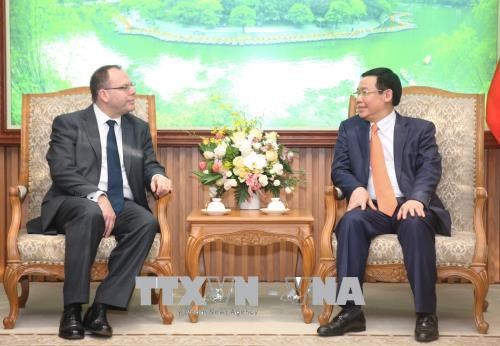 Deputy Prime Minister Vuong Dinh Hue meets with Julian Adams, Group Regulatory and Government Relations Director of life insurer Prudential in The government is developing a scheme for reforming The Government of Vietnam is committed to stablise the macro-economy, control inflation and pursue investment attraction policies to facilitate foreign investors, including those from the Adams said next year will mark the 20th year of Prudential’s presence in It is also ready to work alongside the government to address challenges of the aging population in the country, reducing burdens on the State budget, he added. The Deputy PM affirmed that they are the issues of great interest of the government as The nation is striving to shift its population policy’s focus from birth control to population and sustainable development and to maintain a reasonable fertility rate, which is declining in big cities, he noted. At the same, the government is pursuing the public debt restructuring plan and the issuance of long-term government bonds is the key to the plan, The government also plans to expand the social insurance coverage by encouraging people to buy life insurance. PM holds working session with Nhan dan newspaper  Prime Minister Nguyen Xuan Phuc (L) and Nhan Dan Editor-in-Chief Prime Minister Nguyen Xuan Phuc held a working session with Nhan dan (People) newspaper in Hanoi on March 5 on the occasion of the 67th anniversary of the issuance of its first publication (March 11). The PM hailed the newspaper as a “flag of thoughts” in Vietnam’s revolutionary press as many of its articles deal with important scientific evidence on the Party guidelines and the State’s legal policies. He said amidst the fourth industrial revolution 4.0, the paper needs to continue building on the past achievements and tap the existing multimedia model to contribute to the Party and State’s leadership and directions on the press work. The leader suggested further improving the quality of publications to increase readership and building a staff with political firmness and professionalism. In the lead-up to the 13th National Party Congress, the paper is required to closely grasp social developments and raise new initiatives to make practical contributions to the nation. Editor-in-chief of the paper Thuan Huu said the outlet has always well performed its political tasks, raised public awareness of the Party guidelines and State policies, as well as covered domestic and foreign affairs. As an official news channel of the Party, State and people, Nhan dan newspaper now boasts 10 publications with a staff of over 750 editors, reporters and officials, focusing on raising public awareness of Party building, fighting corruption and preventing wastefulness, behaviors of degradation in political thoughts, self-evolution and self-transformation, sabotaging wrongful and distorted allegations by hostile forces and political opportunists. Vietnamese localities seek stronger cooperation with US 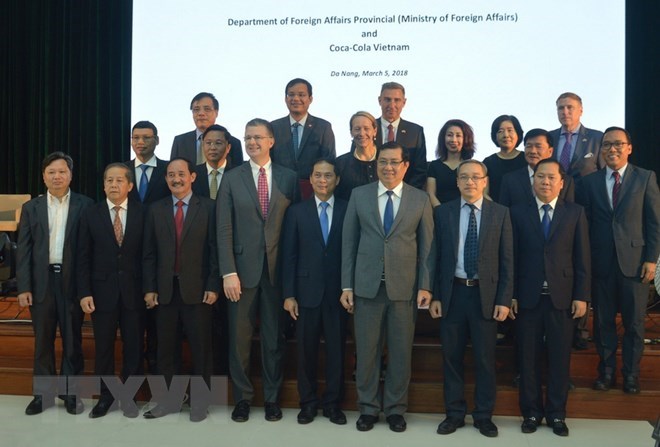 Delegates to the conference. Potential and advantages of localities in The event was jointly held by the Vietnamese Ministry of Foreign Affairs, the Da Nang People’s Committee, the US Embassy and the American Chamber of Commerce in In his opening remarks, Vietnamese Permanent Deputy Foreign Minister Bui Thanh Son highlighted tangible and effective cooperation between Vietnamese and US localities and businesses across fields. The The official stressed that He described cooperation between Vietnamese localities and US businesses, partners and localities as a pillar of the Vietnam-US comprehensive partnership which was established in 2013. Collaboration at the local level has been a supportive channel for cooperative mechanisms at the Government level, especially in accelerating the implementation of joint projects, he said. At the conference, Chairman of the Da Nang People’s Committee Huynh Duc Tho introduced potential and advantages of Tho expressed his hope that US partners will continue to accompany the municipal authority and create more cooperative opportunities in investment, trade, smart city building, start-up and education-training with the city. US Ambassador to Vietnam Daniel Kritenbrink congratulated The “Meet The USA” conference featured four sessions, focusing on Vietnam-US trade and investment prospects 2018 – 2020, smart cities – high technology, start-up, education and workforce. On this occasion, the External Affairs Department under the Foreign Ministry and Coca-Cola Police asked to follow President Ho Chi Minh’s teachings to build strong force 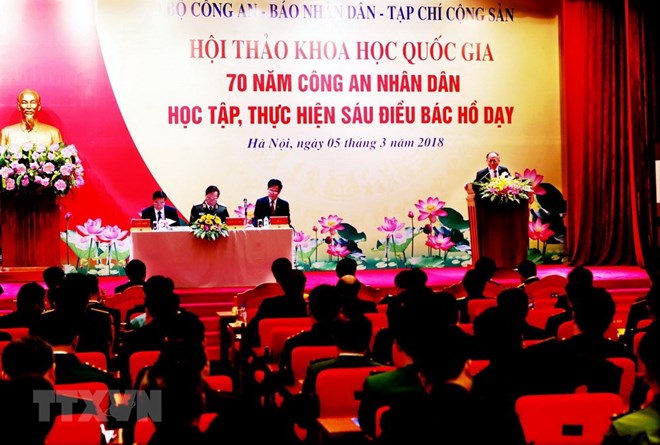 At the scientific workshop General Secretary of the Communist Party of Vietnam Nguyen Phu Trong has called on public security officials to continue following teachings of late President Ho Chi Minh to build a strong and transparent force. He made the statement in his letter sent to a scientific workshop held in The Party leader recognised the police’s efforts over the past seven decades to defeat all sabotage plots and activities of hostile forces in addition to crime prevention to ensure national security, social order and safety in any circumstances. He stressed the significance of the workshop and hoped the event make practical contributions to the protection of national security, social order and safety. The event forms part of activities to celebrate the 70th anniversary of the movement of “Public Security Force follow six teachings of Uncle Ho” (March 11, 1948) and 70th anniversary of President Ho Chi Minh’s call for patriotic emulation campaign (June 11, 1948). During the workshop, participants analysed theoretical and practical values of President Ho Chi Minh's teachings to build and strengthen the Party, and promote the public supervision in the field. Concluding the workshop, Minister To Lam asked the police force to define the continuous implementation of Uncle Ho's teachings as a political task in order to build a strong public security staff in terms of politics, ideology, organisation and morality. Uncle Ho’s six golden letters for the public security force are: “For myself, to be a frugal integrity; For the colleagues, to kindly help; For the government, to must be absolutely loyal; For the people, to be respectful and polite; For the work, to be devoted; For the enemy, must be firmly smart against.” VNN |
↧
